








“Having the means to afford childcare was a big challenge for me then, and decades later, it remains a challenge for too many mothers today. It is extremely expensive. Quality childcare today can cost $500 a week. How can parents afford it, especially when they have more than one child?”
— Women United Executive Council member Tawanda Saffore
Comprised of hundreds of female philanthropic leaders who are generous donors, active volunteers, and fundraisers, United Way of Central Maryland’s Women United membership network boasts a legacy of more than 20 years of social impact. Members work with United Way’s community partners to drive long-term change that helps build healthy, educated, and financially stable individuals and families.

The childcare crisis disproportionately affects women of color. In 2021, according to The Annie E. Casey Foundation, two-thirds of Black children (64%), and 42% of Hispanic children lived in single-parent households.
You can help amplify, advocate, and advance change in childcare!
Join us for United Way’s 2024 Women’s Forum, hosted by Women United.
Honorary Chair: First Lady Dawn Moore
Working parents are a vital part of our community. But costly, unreliable childcare holds too many of them back. Without childcare, they might miss work, get fired, or choose to leave the workforce entirely. At the Women’s Forum, you’ll learn how to help local working parents get the support they need.
Date: September 26, 2024
Time: 2:00 PM – 6:30 PM
Location: Port Discovery, 35 Market Place Baltimore, MD 21202
• Be inspired by featured speaker, Reshma Saujani, the Founder and CEO of Moms First and Founder of Girls Who Code.
• Engage in interactive activities that explore the challenges parents face with childcare
• Learn from a panel of local experts on the importance of quality early childhood education
In 2024, Women United’s key focus areas are childcare and education. Childcare plays a crucial role in supporting women in various aspects of their lives, from being able to advance in their careers, to achieving financial stability, to furthering their education.
According to United Way’s Maryland ALICE (Asset Limited, Income Constrained, Employed) Report, the average cost of childcare in Central Maryland for two children is $1,800/month—often higher than a family’s housing costs. When parents can’t find adequate childcare, they might miss work, get fired, or choose to leave the workforce entirely.
When childcare providers can’t staff to capacity, it affects children, parents, employees and employers, and our local economy. Staffing shortages mean longer waitlists, fewer slots for children, lost income for employees, reduced operating hours, and sometimes, even the closure of centers.
Women United members joined hands in 2024 with United Way staff, volunteers, and families for a special Advocacy Day at the Maryland Statehouse to voice their support for legislation designed to breakdown existing barriers to childcare by reducing the turnaround time for background checks—which can sometimes take months—for qualified staff in Maryland childcare centers.
Sponsored Content
• Enjoy a networking happy hour with opportunities to take action to drive change in childcare—and have fun at Port Discovery!
Scan the QR code to buy your ticket and check out the fun video at registration!

Make YOUR voice heard by joining the powerful Women United team! Learn more at https://UWCM.org
Sponsored Content by JPMorgan Chase
Anyone can be a victim of a scam or fraud.
Scammers are always looking for ways to trick consumers out of their hard-earned money, but there are steps you can take to protect yourself and your loved ones. Being alert and informed are the best defenses to stop scammers in their tracks.
It’s important to know the signs of a scam and always protect your personal information and account numbers—those are the things scammers want the most. In general, remember that anything that sounds extremely urgent, too good to be true, or suspicious, is likely a scam.
You can ignore, block and delete calls and messages that you don’t recognize. If s suspicious message says something is wrong with a transaction or charge on your accounts, don’t trust caller ID and call the number on the back of your card. Some common scams include:
Watch out for that email, text or call from “your bank”
Scammers can impersonate banks, utility companies and government agencies to trick consumers out of money. Scammers will contact victims via call or text, demanding money to ensure something doesn’t happen to their accounts. Sometimes, they say they need your account information to investigate suspicious activity. They “spoof” or trick you by

impersonating the caller ID information from your bank, or website links that look legitimate. If someone calls you and tells you there’s something wrong with your account, hang up and call your bank directly using the number on the back of your debit or credit card.
Don’t let your favorite retailers fool you
Scammers will claim to be a company you may be familiar with and declare there is an issue with your account or a recent order or send you a fake receipt for goods to incite you to dispute them. Make purchases from trusted websites and vendors only; steer clear of private sellers or websites with sales at prices that seem too
good to be true. Never go off an online platform to close a deal or communicate with a buyer or seller.
Beware of rental scams
Scammers may pose as landlords looking to rent a property and convince the victim to send a deposit to hold it. Make sure the listing appears on multiple online platforms, has a detailed description, contact information and good customer reviews. If possible, meet the landlord in person and visit the property to ensure the rental offering is legitimate before fulfilling any request for a money transfer.
Beware of tech support offerings Some scammers will assert there
are issues with your computer by posing as tech support and encourage you to click suspicious links via text or pop-up windows on your computer to help solve your “issue.” If a caller says your computer has a problem, hang up. Never give anyone remote access to your computer unless you can 100% verify who they are. If you’re worried about a virus or other threat, call your security software company directly, using the phone number on its website.
Stay away from “malvertising”
Scammers are placing fake phone numbers in search engines and online ads under the names of legitimate companies like banks or airlines. People call those numbers and are tricked into sharing account or other personal information. Avoid this “malvertising” by typing the full URL for the company in the address bar instead of entering the company name in the search bar, and don’t click search ads.
Beware of Artificial Intelligence (AI) or “deep fake” scams
Smart technology allows scammers to duplicate familiar voices and trick consumers out of their money and personal information. Scammers can gain the trust of victims by pretending to be a close family member or friend in need of money. Be extra careful of friends or family members calling suddenly and
needing help. Hang up and call them back on a number you know to be theirs or call someone else who knows them.
How you pay matters
Digital payment methods can help limit access to fraudsters finding your bank account. When sending money digitally, however, always make sure you know and trust who you are sending money to. If you send money, you may not get it back if it’s a scam.
Be Calm, Be Confident
Even if you aren’t aware of all emerging threats, you can protect yourself from becoming a victim by refusing to give your personal or banking information if someone contacts you by email, text or phone. Creating strong passwords for your online accounts and changing them often can also help protect your digital footprint. The best defense is to stay calm and confident and use technology to your advantage: ignore, delete and block calls, messages or emails from sources you don’t recognize and remember that banks will never ask for personal information when calling you or urge you to send money.
If you become a victim, don’t be embarrassed, and report it to your bank. Also, tell family and friends about your experience so they too can be on high alert.
For more fraud and scam prevention tips, visit Chase.com/ SecurityTips, and www.ftc.gov

By Dr. Frances Murphy “Toni” Draper AFRO CEO and Publisher
Black adults have the highest divorce rate and the lowest mar riage rate of any ethnic group. And, according to my own research, and my experiences in clinical practice as a licensed pastoral counselor for many years, Christian couples divorce at the same rate as everyone else. In addition, there is a correlation be tween good mental health and healthy marriages. Those who are in healthy, satisfying, marriages are happier than those who are not. In fact, “healthy marriages” was the subject of my doctoral dissertation entitled: Relationship
mental, physical, spiritual, emotional or sexual abuse. Marriage, however, works if you work it!
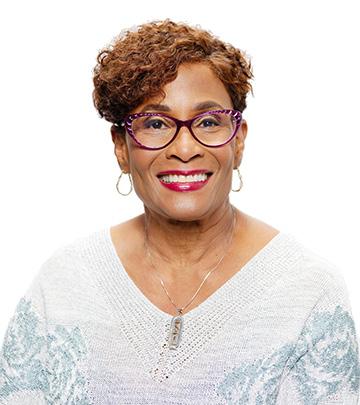
Theology: A Model for Producing Healthy Marriages in the African American Context https://archive.org/ details/frances-draper-final-document-2006 ).
Earlier this year, my husband and I celebrated 50 years of marriage and for 50 days leading up to that momentous occasion, we posted “a tip” a day on Facebook and Instagram. We received many comments and personal notes saying that these “tips” were a blessing and a huge help for many married couples.
Often, we were asked if we would consider writing a book. Yes, we are writing the book (in 2025), but for those who missed our “Fifty for Fifty” or want a refresher, here are just ten of our “tips,” in no particular order:
1. Put God first -It is absolutely true that a couple that prays together, stays together.
2. Don’t sweat the small stuff. Most of what couples disagree about falls into the “small stuff” category– just put the cap back on the toothpaste!
Courtesy photo
Dr. Frances Murphy “Toni” Draper serves as AFRO CEO and publisher. This week, she discusses mental health and marriage.
Let me be clear at the outset: you don’t have to be married to be happy. Marriage is not for everyone. It is not “one-size fits all.” Many people rightfully and righteously embrace their singleness and are more than satisfied (and happy) being single. But if you do decide to get married, especially if you and your fiancé (fiancée) also decide to have a big, expensive wedding, it is a real drain on your mental and emotional health –not to mention your financial health–to separate and / or divorce. Of course, there are those situations where divorce is the only option due to a pattern of

Your History • Your Community • Your News
Afro-American Newspapers Baltimore Office • Corporate Headquarters
E. Redwood Street 6th Floor, Suite 600G
Maryland 21202 410-554-8200 • Fax: 410-554-8213 afro.com
Founded by John Henry Murphy Sr., August 13, 1892
Chairman of the Board/Publisher - Frances Murphy Draper
(Publisher Emeritus - John J. Oliver Jr.)
President - Benjamin Murphy Phillips IV
VP of Marketing and Technology - Kevin E. Peck
Director Digital Solutions - Dana Peck
Receptionist - Wanda Pearson - 410-554-8200, ext. 246
Director of Operations
Andrè Draper - 410-554-8200
Director of Finance
Bonnie Deanes - 410-554-8242
Executive Director/Director of Advertising Lenora Howze - 410-554-8271 - lhowze@afro.com
Director of Community & Public Relations
Diane W. Hocker - 410-554-8243
Editorial
Managing Editor - Alexis Taylor - 410-554-8257
Special Projects Editor - Dorothy Boulware - 410-554-8231
Editorial Assistant - Ama Brown-Parson
Archivist - Savannah Wood- 410-554-8277
Baltimore Circulation/Distribution Manager
Andrè Draper - 410-554-8200
Production Department - 410-554-8200
Washington Office 1140 3rd Street, N.E., 2nd Floor Washington, D.C. 20002-6723 202-332-0080 • Fax: 410-554-8213
(Washington Publisher Emerita - Frances L. Murphy II)
Director of Operations - Andrè Draper - 410-554-8200
Customer Service, Home Delivery and Subscriptions: 410-554-8200

3. Don’t use sex as a weapon. It is God’s gift to a man and a woman committed to one another in holy matrimony.
4. Be willing to do what your spouse likes to do, even if you don’t particularly want to do it– even if it means hopping on a train to Yankee Stadium. Both of us are avid sports fans. He’s a Yankee, Cowboys, Lakers fan and I’m an Orioles, Ravens, no particular basketball team fan. To his credit, he cheers for the Orioles (as long as they’re not playing the Yankees), and he likes the Ravens. And I root for the Cowboys (as long as they’re not playing the Ravens – which isn’t often). But the Yankees??? Ya’ll pray for a Sistah!
5. Do not discuss and analyze your marital “disagreements” with anyone other than your spouse, unless it’s with a mutually agreed upon “qualified, trained, compassionate, professional counselor.” Counseling works when you really commit to it—especially premarital counseling. Your unmarried, twice divorced, can’t maintain a long-term, committed relationship girlfriend, guy friend or anyone who starts the sentence with “if I were you…,” is absolutely not the best person to get advice from. I’m just saying….
6. The only person you can “control” is you. The only mouth you can close (or open) is your own. In 50 years, we have never had a violent or out of control argument. Note: I didn’t say we never had a difference of opinion – we’ve had our share of those! To reduce stress, to maintain a healthy state of mind – practice disagreeing without being disagreeable; go to another room, practice taking a deep breath, counting to 20 or whatever it takes to suppress your first reaction – just because it “comes up”, doesn’t mean it should “come out.”
By Alexis Taylor AFRO Managing Editor
Growing up, my mother was known for working. She was your classic Black woman workhorse, 1964 edition.
What my father didn’t teach me about work ethic, my mother did. But the lessons were different. Extra shifts at work, Christmas clock-ins and years of vacations where she could do nothing but sleep. There were no sandy beaches for her- vacation always meant a small respite from her one, usually two, jobs to simply sleep.
Like most Black mothers, she was doing it all for her family. My mother dutifully took care of my two brothers and I in every way possible, regardless of what life threw at her– and there were some tall mountains to climb. During my childhood, everything she did was to serve others.
As a nurse, with a heart for children, the elderly and the disabled, it was my mother’s calling to help others. She routinely helped organize events at our church of choice, near whatever military base we were living on at the time. At work, she was known for being the first person to arrive and the last person to leave. Her work had to be finished before she left–no outstanding deliverables could be left for the next shift of nurses and aides. Her friends always knew they could call on her for help– whether it be money to hold them over to payday, or shelter as they solidified housing plans. My mother’s answer was always “yes.”
And then, a shift.
My mother started going to therapy. She read a book called “Boundaries: When to Say Yes, When to Say No, To Take Control of Your Life,” by Henry Cloud and John Townsend. She started telling people “no,” and I saw their reactions. They
7. If he or she is not ready to talk, don’t force it. But don’t ignore it either. Agree on a time, ideally within two to three hours of “not now,” to talk about whatever the issue is. By the way, texting is not talking! And, listening takes practice – lots of it. Don’t be in such a hurry to get your point across. You don’t always have to be right.
8. Don’t let your body go. His 28 inch waist, and your size six (you pick the number) may be a thing of the past, but be intentional about keeping your body as fit and as healthy as possible. It’s good for your life span, as well as your long-term marital happiness.
9. Never go to bed angry or ugly – yes, attractive nightwear is still necessary five, 10, 20, 30, 50 years later. It doesn’t have to be fancy or uncomfortable, but if it doesn’t match, if it’s frayed or torn or missing buttons, stained, mismatched, or as old as you are, do not wear it to bed, do not donate it to the thrift shop– throw it away!
10. Do not commit emotional, spiritual or physical adultery. Too many extra marital affairs are born out of what seems innocent at first, i.e. he’s easier to talk to, he understands me, she pays attention to me, and she looks good all of the time. Some folk—even in the church—could care less about your marriage or your family, and make it their mission to kill, steal and destroy you and your marriage.
I hope these tips are helpful for the married, as well as those planning or desiring to be married.
I also hope you will read with great interest each of the articles in this special edition. Our writers and editors have carefully selected topics designed to promote good mental health on a variety of topics. From mental health tips for entrepreneurs to advice for veterans, this edition is all about self-care. Happy, healthy reading!
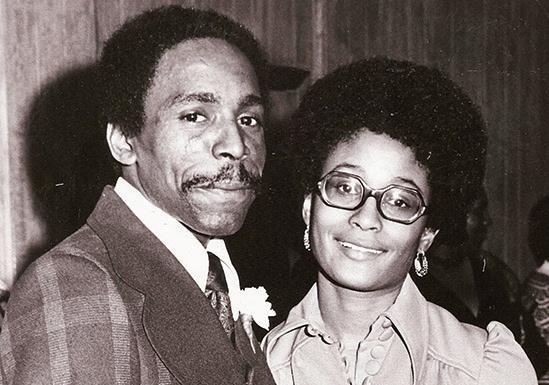
weren’t happy that she couldn’t be run ragged serving their purposes, with little or no benefit to her. She saw– and I saw, peeking from the background– who her real friends and family were.
The lessons were clear.
Self-care can be hard. Self-care can be ugly. But it’s necessary, because here’s the hard truth: People will allow you to run yourself to death and then get mad when you drop.
For me, at the heart of self-care is a person who believes they are worthy of care. The Cambridge Dictionary defines “care” as “the process of protecting someone or something and providing what that person or thing needs.”
How can a person protect or provide for others if they don’t have what they need? And if you’re not protecting or providing for yourself, the bigger question is– “why?”
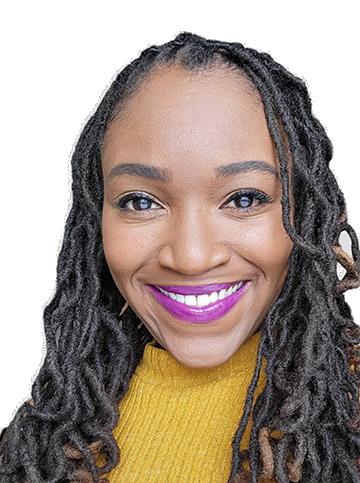
Whether it be exercise, food, sleep, space to decompress or that doctor’s appointment that keeps getting postponed, the time is now to prioritize you.
Only you can put yourself first. And for all the parents out there, remember, there are people watching you to develop their own sense of self worth through their own self-care practices.
A funny thing happened when my mother began to prioritize her own self-care, she began to truly live. Her heart for service still beats true to this day, as she continues to work in the healthcare field. But she’s happier and less stressed in a new position, more aligned with her interests, within the same company. She still volunteers at church, but in a capacity that doesn’t overwhelm her or her personal time.
While I still have to occasionally remind her to clock out, today she serves as a new example– a shining example– of what happens when you put yourself

By Wayne Campbell
What is self-care?
The World Health Organization (WHO) defines self-care as “individuals, families and communities’ promoting and maintaining their own health, preventing disease and coping with illness and disability, with or without the support of a health worker.” Self-care is not selfish. One cannot pour from an empty vessel. In order for us to effectively take care of others, we must first take care of ourselves.
The idea of self-care and the practicality are oftentimes out of balance. This is likely to manifest itself in frequent bouts of burnout episodes and depression.
Caregiver burnout
Caregiver burnout is a state of physical, emotional and mental exhaustion that happens while you are taking care of someone else.
Stressed caregivers may experience fatigue, anxiety and depression. You can reduce your risk of burnout by participating in respite care, joining a support group or talking with a mental health professional. Sadly, it is not uncommon for the caregiver to die before the person being cared for, especially in circumstances where the caregiver for whatever reasons cannot take a break.
In situations where you are the only caregiver, it is very likely that you are always on call seven days per week. This is especially so when caring for elderly parents. It is challenging almost impossible to take time to cater to yourself.
Notwithstanding this reality self-care is about empowering people to be active agents in their own healthcare. Being an active participant in your own healthcare ensures that you will continue to give care to others who depend on you as well as relieves pressures on health systems. Those pressures are growing and include: 4.3 billion people with inadequate access to essential facility-based health services, an estimated global shortage of 10 million health workers, mainly in low-and-middle income countries.
Self-care v. health care
Self-care has become incredibly important as people realize the need to take care of themselves and put themselves first. This has made people talk about it and increased the interest of others to take control of their health and wellness by prioritizing themselves.
Self-care interventions do not replace health systems, they enhance them. Selfcare is a part of a holistic approach to healthcare. While self-care can mean different things for different people, it is a broad term that covers what a person does or engages in to improve or preserve their physical and mental well-being. Most people already practice self-care to stay healthy. This includes eating healthy foods, taking medicines and doing physical activities. According to the World Health Organization, there are eight main areas of self-care: physical, psychological, emotional, social, professional,

Wayne Campbell is an educator and social commentator with an interest in developing policies as they affect culture and or gender issues. This week, he discusses the need for selfcare while addressing the pressures of life.
environmental, spiritual and financial.
Many of us often overlook spiritual self-care. This component is critical to complete a holistic approach to caring for ourselves.
Spiritual self-care involves activities that center on spirituality and activities that nurture the soul. These include: engaging in prayer and meditation, attending a worship service, attending a retreat or by going for a nature walk.
Workplace self-care
Employees may find it essential to engage in activities that allow them to share their skills and strengths and make them feel fulfilled in their careers. This may also include striving for a work-life balance and doing tasks that prevent burnout. A 2020 American Psychological Association (APA) survey
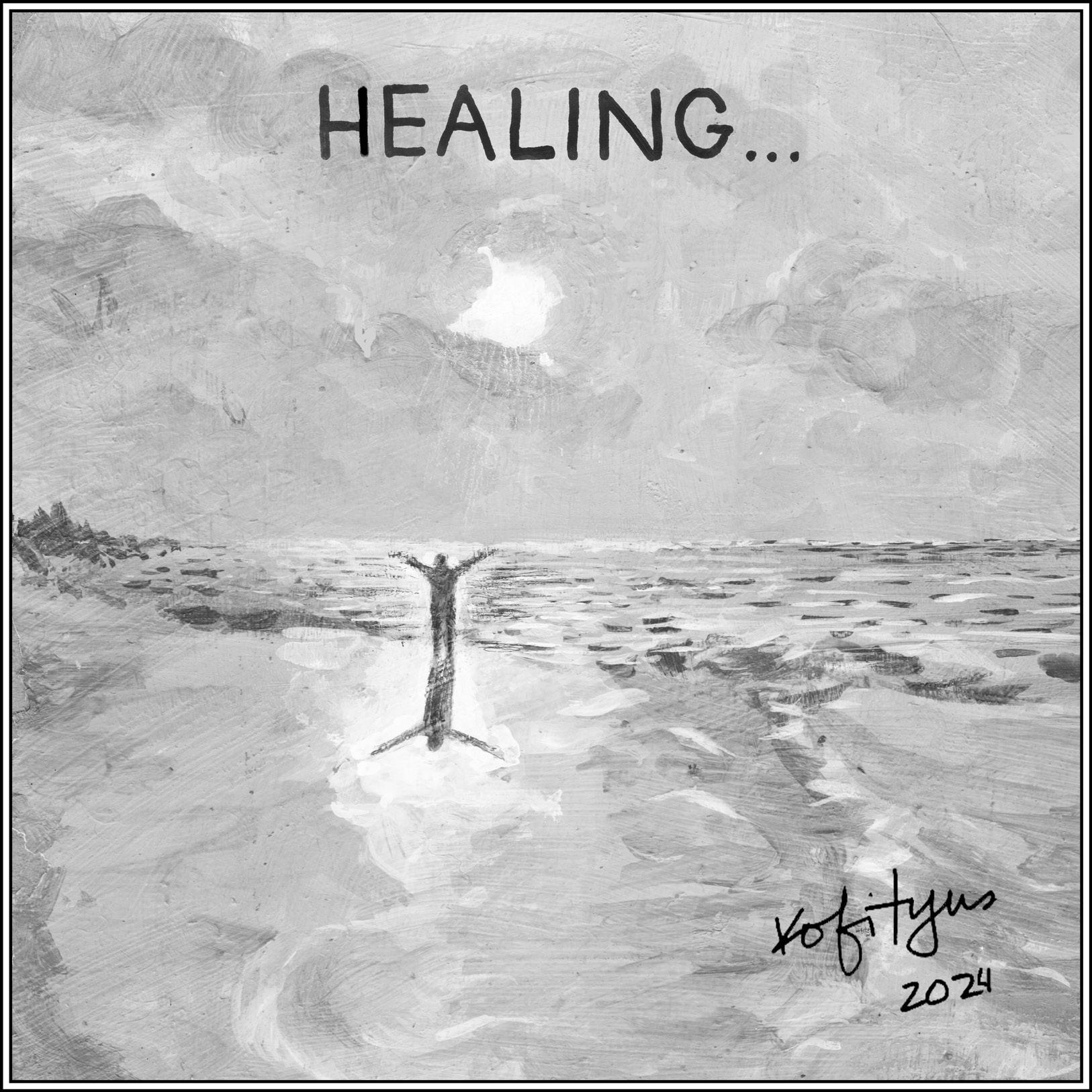
found that three in five employees experience adverse impacts of workrelated stress, like lack of interest, motivation, or energy and lack of effort at work. Self-care examples related to work include: taking a mental health break or vacation leave when necessary. Not responding to work emails or messages outside of office hours or by attending seminars and conferences. France in 2016 passed a law that makes it illegal for employers to expect employees to engage in work related activities outside of office hours. This helps maintain a healthy work-life balance, as well as provides time and energy to put towards personal growth.
Financial self-care
Financial self-care may also include managing one’s finances and actively meeting one’s financial goals and obligations. Examples of financial self-care activities include: paying bills, learning about money management or completing tax responsibilities on time.
Emotional self-care
A person needs to learn how to acknowledge and regulate emotions as they arise and healthily process them. Emotional selfcare can help individuals navigate their feelings, increase empathy and learn coping mechanisms to deal with difficult emotions. Some examples of emotional self-care are: listening to music, meditating, blogging
or journaling and practicing self compassion.
Feeling selfish or guilty
Many people worry about being perceived as selfish if they practice self-care. People may feel compelled to use their time for others instead of self-care, particularly those in caring professions or with caring responsibilities. This week, let us all be reminded that it is important to set aside time to prioritize, replenish and reinvigorate ourselves. Be kind to yourself! In the words of Eleanor Brown, “rest and self-care are so important. When you take time to replenish your spirit, it allows you to serve from the overflow. You cannot serve from an empty vessel.”
By Maurice Carroll Special to the AFRO
There have been moments where I’ve been seated in frustration, irritated and was so fed up that I emotionally gave up and said aloud “I don’t care anymore.” This feeling had me drowning in depression because I was focussed on what could have been or should have been. It also had me pressed against a wall of anxiety due to my overwhelming thoughts about the future and what was possible or might not be possible. I just couldn’t find my “present moment,” as so many mental health holistic coaches had non-personally advised.
“I don’t care anymore” was the mantra that had me pinned in a nonchalant gloomy physique that outwardly appeared as merely “being quiet.” I was comfortable in my discomfort. I secretly yet passively wanted to be better, but I was frozen in analysis paralysis.
The honest and deeper, transparent feeling that I had was me subconsciously sobbing for things to just be right. I had convinced myself that saying “I don’t care anymore” would rid me of the concerns that I had which would free me to move on with life. I, probably just like you, had convinced myself that no one else was experiencing what I was and, even more so, that they wouldn’t understand. I was right and wrong at the same time.
Nobody else could have my experience because they weren’t me and therefore couldn’t possibly fully understand things from my perspective. However, I learned later that a lot of people I knew had felt the same
exact thing. I found myself not being able to live their existence nor fully understanding from their perspective fully because I wasn’t them. “So where does that leave me?” I selfishly thought.
I didn’t realize the depth of my mantra. If you’ve said that too, perhaps you didn’t or don’t understand the extent of the statement either. “I don’t care anymore” is the cry for help, a moment of surrender and the solution all cryptically embedded in one statement. If you’ve found yourself saying this, here is a different perspective that should be useful. When that thought enters your mind or even if you say it outloud follow these simple but not always easy steps. It will be worth the time and energy.
1. Pause: After saying it or thinking about it, pause. Don’t reflect, don’t project. Don’t analyze. Just simply give yourself a moment. That could be taking a deep breath. It could be closing your eyes or looking to the sky. It could be as simple as saying “ok” or “wow” to yourself. The point is to just give your mind a break from it for a moment.
2. Press reset: What can you do in this moment to care for yourself? Even if your answer is “I don’t know,” begin to explore possible options. There are self-care options for you that you can do for free and alone or with a group. There are other options that you can pay for. The point is to refocus.
3. Forgive: When we fall short of our intentions, it is convenient to default back into depression, anxiety and stress through the lens of judging yourself. Give yourself a little grace. Forgive yourself if you weren’t as successful as you predicted and do it again.


By Jacquelyn Clemmons-Muhammed
Special to the AFRO
When
is countrymen. The ability to focus on healing themselves after birth was eclipsed by their primary task to nourish those around them. Sadly, the aftermath of this burden has resulted in generations of Black mothers who haven’t focused on allowing themselves to heal and rest postpartum.
The immediate postpartum period can be a challenging time, both physically and emotionally for new mothers. It is important to prioritize your mental and emotional well-being as you navigate the transition into motherhood. Here are three crucial steps that you can take to nurture your mind and spirit after giving birth.
Give yourself grace
The first and most crucial step in caring for your mental and emotional well-being after birth is to give yourself grace. Understand that it is normal to experience a wide range of emotions during this time, including joy, sadness and anxiety. The pressure to conform to societal expectations of motherhood can be overwhelming, but it is important to remember that there is no “right” way to be a mother. Embrace the journey and allow yourself the space to make mistakes and learn from them. It is essential to be kind to yourself, particularly in moments when you feel overwhelmed or inadequate. Practicing self-compassion can help alleviate the pressure of new motherhood and help foster a positive mental state. It may be tempting to compare yourself to other family or community members, but be reminded that it is ok to take time to figure out what works best for you.
No matter how small they seem, take the time to acknowledge your accomplishments, and celebrate them. Remember that it is okay to ask for help
and take breaks when needed. By giving yourself grace, you are nurturing and giving yourself an opportunity to lay a strong foundation for your motherhood journey.
Create healthy boundaries
Another vital aspect of caring for your mind and spirit after giving birth is to create healthy boundaries. Motherhood often comes with a myriad of responsibilities and expectations, and it is easy to feel pressured to meet everyone’s needs while neglecting your own. Setting boundaries is essential for preserving your mental and emotional energy and preventing burnout.
Establishing boundaries can involve communicating your needs to your support system, including your spouse, partner, family and friends. Clearly articulating your boundaries regarding visitors, responsibilities and personal time will help create a supportive and nurturing environment for both you, your baby and immediate family. It’s okay to prioritize your well-being and establish limits on what you can handle, without feeling guilty about it. By creating healthy boundaries, you are fostering a space that allows you to prioritize healing and self-care while maintaining a sense of balance and control in your home.
Plan and accept support
Lastly, it is so important for Black mothers to plan and accept support during the postpartum period. Being a new mother, no matter how many children you have, can be overwhelming. It is crucial to have a strong support system in place to help you navigate the challenges that come with motherhood. This support can come from a variety of sources, including local postpartum doulas, your spouse or partner, family, friends and healthcare providers.
When considering the type of support you will need, assess the existing needs of your family. Some families may need more hands-on support with older sibling care, others meal planning and preparation, while newborn care support may
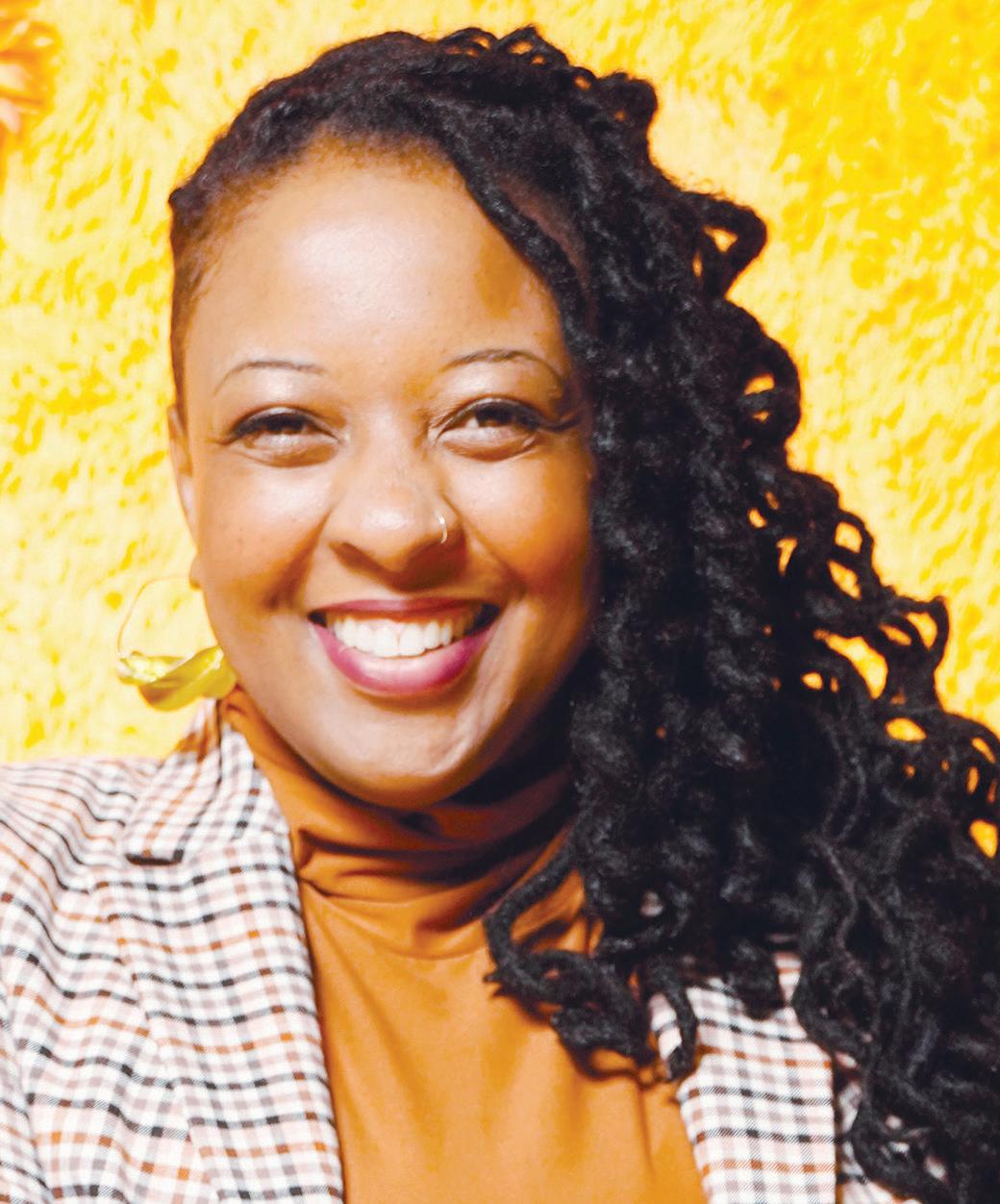
Prioritizing self care after birth can be a struggle for some new mothers. This week, doula Jacquelyn Clemmons-Muhammed speaks on bringing balance and self-care to daily routines to postpartum life..
provide much needed rest and respite in other family dynamics.
Plan for support by reaching out to your loved ones or a professional and discuss specific ways in which they can assist you during this time. Whether it is through help with household chores, caring for the baby, or simply providing emotional support, it is important to communicate your needs and accept help when it’s offered, rather than trying to handle everything on your own.
Additionally, seeking professional support, such as therapy or counseling, can provide invaluable guidance and emotional support as you adjust to motherhood. There are mental health providers with specific training and tools to support postpartum families and their unique challenges.
It is important to recognize that it is okay to prioritize your mental health and seek help when needed. When mothers are doing well mentally, physically and emotionally, their families thrive. By planning and accepting support, you are creating a strong network of care and habits that will uplift and sustain you during the transformative journey of motherhood.
What fathers can do
Fathers play a crucial role in supporting their partners’ healing after childbirth. During the immediate postpartum period they become the gatekeepers of the health and well-being of mom and baby. By ensuring you receive adequate rest, food and emotional support they can help guard the rhythm of the household.
Listening attentively, offering words of encouragement and showing empathy are important ways new fathers can contribute to their partner’s wellbeing. Taking on practical tasks such as preparing nutritious meals, managing visitors and organizing appointments can alleviate the burden on the new mother. By being actively involved in the postpartum recovery process, he can establish and deepen a healthy bond with both mom and his baby. How a couple navigates pregnancy, birth, and postpartum has strong implications to the longevity and health of their relationship. Mindful support in this season is a father’s investment in a strong foundation for his family.
You’re worth it
Prioritizing mental and emotional well-being after giving birth is essential for Black mothers and their families. By giving yourself grace, creating healthy boundaries and planning and accepting support, you can nurture your mind and spirit during this vulnerable and transformative time. Ultimately, investing in your well-being and seeking supportive care will empower you to thrive and embrace the joys and challenges of motherhood while building a resilient and nurturing foundation for yourself and your family.
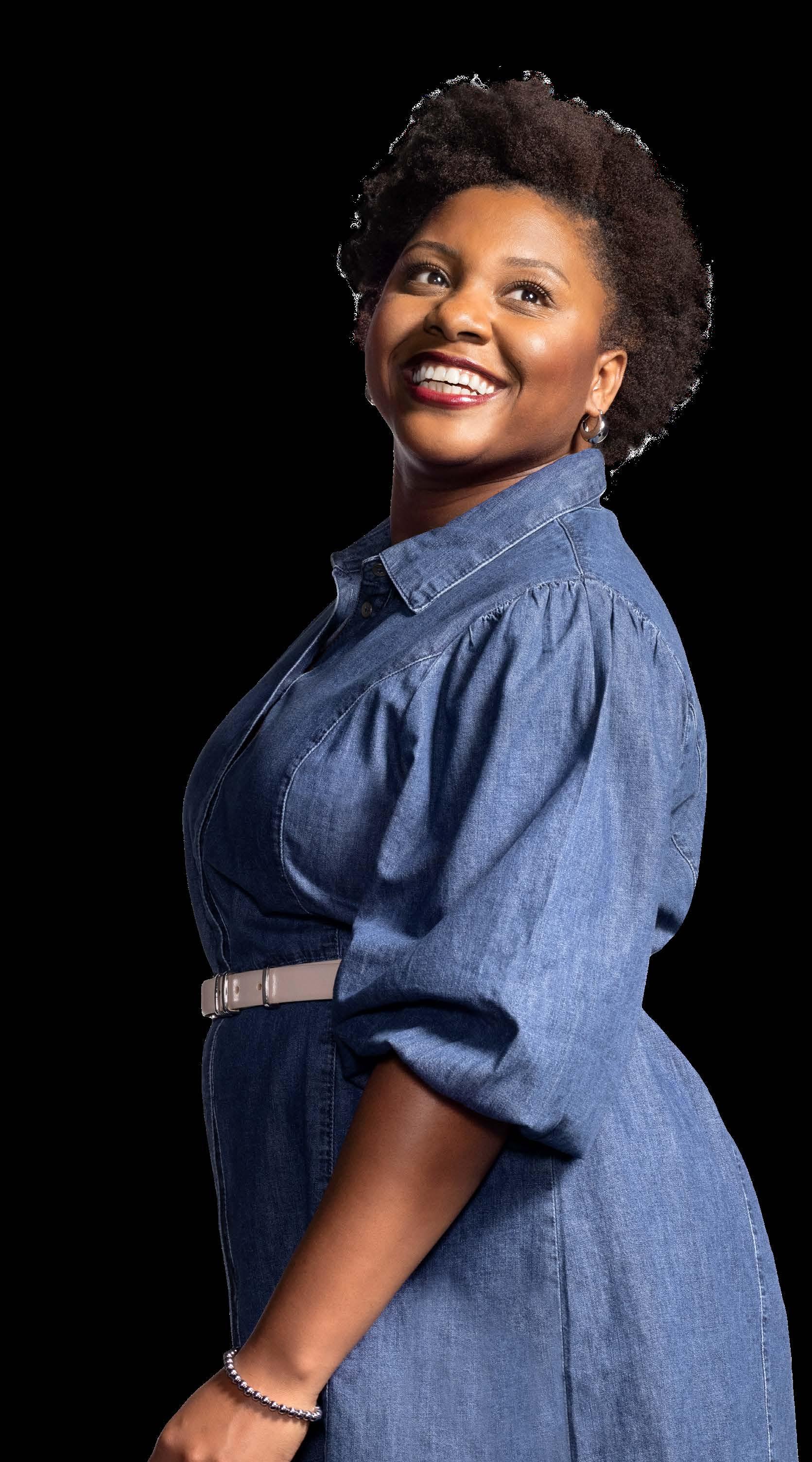

By Rev. Dorothy S. Boulware Word In Black
Six years ago, I was in Turks and Caicos celebrating my 50th wedding anniversary, walking the entire expanse of the resort and having a great time with the entire family — children, grands, and even great-grands. I had no thought of infirmity of any type. Nothing was slowing me down.
By 2021, both hips needed surgery, but it was considered cosmetic and had to wait. In the interim, we tried physical therapy and injections. Neither worked.
So, in March 2022, I went in for what was to be a typical hip replacement, and the plan was that six weeks later, I’d have another typical hip replacement and get on with my life. Not so much.
It’s 2024. I’m walking with a cane, and I’m grieving the mobility I enjoyed until then.
Although I’ve lost too many friends too soon, I chose to mention this loss because it’s often overlooked when we think about grief.
Grief is all around us. We grieve individually, and we grieve collectively. And it’s compounded by our shared social media culture.
So, what do we do with all this grief?
I spoke with my favorite counseling psychologist, Toni Boulware Stackhouse (my daughter), who started her practice, Life Matters Wellness, in 2020 during the pandemic when people were going stir-crazy from being locked up with too many relatives in too little space.
Challenging the prosperity gospel In response to my question of how the church can be more helpful in the grief process, our conversation immediately went to the “prosperity gospel,” which seems to suggest, depending on the teacher, that anyone who is on firm ground in their faith should have everything they need and want and not hurt, be ill or suffer loss of any kind. She said that’s the problem.
exceedingly sorrowful.
“So when we go through, we use cliches like, ‘I’m blessed and highly favored,’ rather than tell the truth that we’re devastated or in pain. What we have created in the culture of the church is that it’s not OK for you to be not OK, and we need to reverse that,” she says. The church needs to be the place where we can be and feel whatever we need in that season.”
“What
“One of the things the church can do is be more realistic about the fact that loss and death are parts of life. As much as there will be birth, there will be death. It’s the cycle of life. And that doesn’t speak to people dying prematurely, or prematurely in our sight,” Stackhouse says. “I think the thing with the church is we try to over-spiritualize some things. And we try to make people feel like, in a lot of instances, if you can’t accept things, if you feel like you gotta grieve, or you feel sad, or depressed or you are anxious, then you are not spiritually mature. Or something is wrong with you. And that’s not true. She often references for her clients the scripture that details Jesus’ walk toward the hill of his death and describes him as being
“That speaks to the humanity of Jesus because he came to walk the earth so that he could be an example for us, right? And show us that it’s okay to be human. He knew what he was going to do. He still felt the grief of the process. And the Bible describes it as exceedingly sorrowful. Those words sound like depression, right?”
Many of Stackhouse’s clients come for more specific situations only to discover the real problem is grief. For those who find grief to be their current reality, she
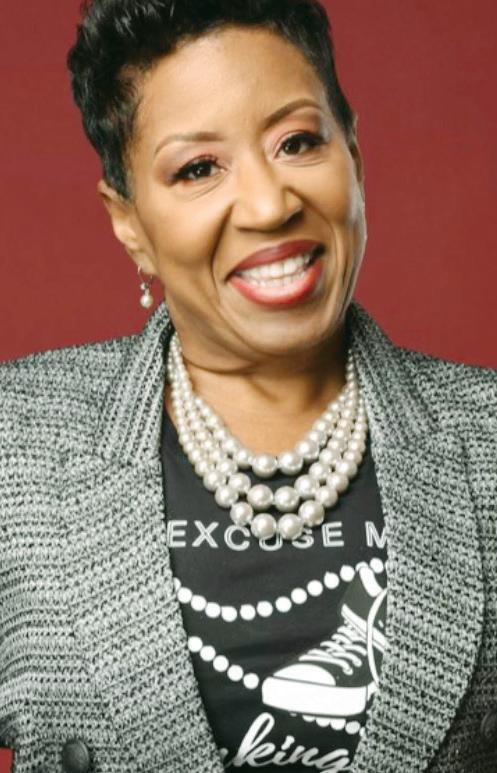
young people at his church, New Macedonia Baptist Church, in Southeast Washington, D.C. In addition to his gifts and extensive professional training on the subject of grief, this doctoral student is, unfortunately, an expert.
When he was 13, his mother was killed in an automobile accident, and he went through all the expected stages of grief. He argued with God and questioned God’s keeping people addicted to and abusing drugs but taking his mother, “who was always singing and shouting, praising and living a good life.”
burden. “The blessing is that in those hard times, you can teach students how to rely on God. They come to a place where they realize people don’t meet the need,” he says. “So it’s really helpful in aiding them in getting to see another version of God, even in difficult moments.”
Who says I’m going to grow up?
suggests tools to help get through.
“I tell people to make space for it. When you feel like you need to cry, cry. If you feel like screaming, cussing, whatever it is that you feel like doing, allow yourself to do it because that means you need that release from your body. Grief has stages,
and grief also has moments — unpredictable moments,”
Stackhouse says.
“Journaling is good, voice or writing. Find ways to keep the legacy or memory of the person, especially for the younger ones in the family. Take up a craft or a hobby of the loved one you’ve lost and keep it going,” she says.
“If the person was a gift giver, then give the same kinds of gifts.”
She also encourages people to talk about their loved ones and share memories with those who are also experiencing the loss, allowing them to do the same.
The weight of youthful grief
Rev. Therm James Jr. ministers to the “cradle to college” crew — between 150 and 175
Now, he works with young people experiencing grief in as many areas as the adults around them, but from a different perspective. The seniors lead worship on designated days, one of them being Back to School Sunday, which fell on August 25 this year. They do everything, including preaching the sermon.
“The young lady who’s preaching is using for her text Acts 1:8, ‘But you shall receive power after that the Holy Ghost is come upon you,’ and they’re encouraged to include their personal stories in their sermons. Hers is dealing with the loss of someone who was like a grandmother to her, and that experience took all types of turns,” James tells me. “She’ll talk about how to access the power of the Holy Spirit to help with the grieving process.”
The father of five said student grief is something he’s passionate about and understands how to navigate. He calls it his blessed
The problem is that these children have experienced so much loss that “I would even argue that some of our students have become almost numb to it. Whether it is schoolmates or where they hang out. I do have some students who still live in what we might call the hood or rougher areas,” James says. He was taken aback when one of his young men said, “Pastor TJ, all this stuff you’re talking about growing up, but who says I’m going to grow up?”
“And it hit me in a different way, hearing ‘I’m not going to be here for a long time, so let me just have a good time,’” he says.


By Ariyana Griffin AFRO Staff Writer agriffin@afro.com
Within recent years, there has been an increase in mental health resources and support for K-12 students inside of schools to help provide safe environments that allow the students to thrive academically, mentally and socially.
According to the National Center for Education Statistics, “61 percent of public schools reported that the percentage of staff expressing concerns with students exhibiting depression, anxiety, trauma or emotional dysregulation/disturbance increased, including 23 percent that reported it ‘increased a lot.’”
However, the agency pointed out several barriers that prevent public schools from effectively providing resources to their student body. The obstacles include, “insufficient mental health professional staff coverage to manage caseload (55 percent), inadequate funding (54 percent), and inadequate access to licensed mental health professionals (49 percent).”
Rachel Larson, a licensed clinical professional counselor and individual, group, and family therapist at Baltimore Therapy
Group, expressed the importance of youth having access to therapy.
“There are so many stressors affecting youth, both on an individual level and societal level,” Larson told the AFRO. “Many of these stressors can impact a child’s sense of safety, including exposure to bullying, the COVID pandemic, school violence, and violence against marginalized groups.”
She continued, “These incidents are being broadcast to much larger audiences than in the past, which could be part of why we are seeing so many more children presenting with symptoms of anxiety.”
Therapy can serve as a safe place for children and youth to express themselves, leading to them acquiring better communication skills that can be useful at home and schools as well as gaining proper coping mechanisms.
“Although a child may not have control over their environment, therapy can help empower them to feel a greater sense of control over how they can cope with these stressors,” said Larson.
She shared that parents and caregivers should be involved with the treatment, if the child is comfortable, in order to be able to support the child by applying the tools
provided during the sessions. Larson also expressed the importance of finding a therapist that fits the needs of the child.
She shared four tips with the AFRO for K-12 youth and parents when it comes to mental health as well as signs to look out for.
Pay attention to changes in behavior
Changes in a child’s typical patterns of eating, sleeping, level of involvement in activities or school performance could be signs of a mental health disorder.
Check in with your child’s teachers, pediatrician, school counselor, coaches, and most importantly, talk to your child to find out what kind of support he or she needs.
Validate your child’s feelings
Communicate with your child that you are listening and understand how they are feeling. This can help strengthen your relationship as well as support emotion regulation
Keep in mind: you can validate your child’s feelings without validating their logic. For example, if your child starts crying because you made them a pancake for breakfast instead of a waffle, you could say, “I can see you are disappointed because you didn’t get what you were expecting” and you don’t need to acknowledge any more of the content of their reasoning.
Try to avoid dismissive comments such as “get over it,” “calm down,” or “it’s not a big deal” because this can make it more difficult for the child to regulate their feelings.
Don’t take threats lightly
If a child makes a comment about killing or hurting himself, please don’t dismiss it as “attention-seeking.” This child is likely trying to communicate their emotional pain in the only way they know how, and they need help.
Talk to the child in a safe place and ask if he is thinking about suicide. Using the Columbia Suicide Severity Rating Scale can be a great tool to guide the conversation.
If you are unsure of how to help your child in a crisis situation, you can call or text 988 to speak with a crisis counselor. Many counties and cities also have local behavioral health teams that can come to your house to help you through a crisis. Also, please lock away and secure any lethal means and make sure your child does not have access.
Look at the whole picture
Are they eating a balanced diet? Are they getting enough sleep? Are they getting too much screen time? Are they getting enough time outside? Are they taking medications as prescribed? Are they using substances? Are they experiencing any physical illnesses that need medical attention? Are they getting enough time to unwind after school?
Baltimore Therapy Group has been hosting a series of free virtual workshops since July, providing resources and tools for parents and caregivers. Each week the group helps navigate various topics. For more information visit: www.Therapistinbaltimore.com.







By Megan Sayles AFRO Business Writer msayles@afro.com
The integration of artificial intelligence (AI) is on the rise in a number of industries, including the mental health and selfcare space. Its ability to create personalized recommendations, reach a large number of people, augment tasks and analyze human behavior makes the technology well-suited to enhance the industry’s services and resources.
“There are a few startups considering using AI for the diagnosis of mental health, and some have considered using AIs as therapists,” said Sanmi Koyejo, president of Black in AI.
“Many have argued that chatbots like, character.ai, were serving this role for some.”
His organization aims to increase African-American representation in AI, as they have historically been left out of
or feel the complex emotions humans have. There are still considerations to be made about the ethics and tradeoffs of using AI in the mental health space. In any case, Koyejo believes it has the potential to reduce barriers to entry for people trying
“There are a few startups considering using AI for the diagnosis of mental health, and some have considered using AIs as therapists.”
to access care and to confront the shortage of mental health professionals the country faces.

World Mental Health Day, this platform leverages an AI chatbot to provide tailored care and solutions. It employs datadriven strategies, like cognitive behavioral therapy (CBT), dialectical behavior therapy (DBT), meditation and breathing, to deliver support and is available 24/7. Users can vent about their emotions and challenges and learn how to cope and build resilience. All conversations on Wysa are anonymous, helping to reduce the stigma in seeking help.
high impact,” said Koyejo.
“There are too few mental health professionals compared to the needs, and this gap seems to be widening.”
Below are some applications using AI to help people practice self-care while boosting mental
This mental health app was designed with the help of clinical psychologists and researchers to support people with mental health challenges, like depression, anxiety, insomnia and burnout. It teaches users about emotional well-being, challenges their thinking patterns and helps them to resolve conflicts.
On MindDoc, people can
Sleep Cycle
Poor sleeping habits have the potential to negatively affect a person’s mental health or exacerbate existing conditions. Sleep Cycle was created to help people improve their rest quality. It uses advanced algorithms to examine users’ sleep patterns and provide recommendations on an optimal wake-up time and coaching to improve sleep quality. It also offers music, ambience and meditations to help people fall and stay asleep.
Techniques in this selfimprovement app were developed by veteran experts in positive psychology, mindfulness and CBT. After taking an initial assessment of their mood, emotional challenges and goal, Happify provides personalized tracks with activities and games to help them meet their needs, reduce stress and increase their




How
By Aria Brent AFRO Staff Writer abrent@afro.com
boundaries can be a vital part of self-care
Sometimes practicing self-care isn’t about what you’re doing for yourself, but what you’re not allowing others to do to you. Environments and situations that aren’t beneficial can’t always be avoided. However, creating a set of boundaries can help soften the impact it has on you.
Whether it be with friends, family or colleagues– setting boundaries are a vital part of self-care and necessary for a healthy relationship.
“I remember the first boundary I set was with my best friend. I remember telling her what I need and what a healthy relationship looked like for me,” said Storm Estes, the founder of Survivors not Victims, a non-profit organization focused on helping women of color recover from their experiences with sexual and domestic violence. “Not once have either one of us felt like those boundaries were harmful or problematic or like they needed to be revisited or revised. The only thing it’s ever done is help us have the best friendship possible.”
Estes noted that she’s no stranger to setting boundaries and it’s something she practices in all aspects of her life, including at work. The women’s protection advocate explained that even with how much she loves the work she does, she sets boundaries within it due to how heavy her field of work can be.
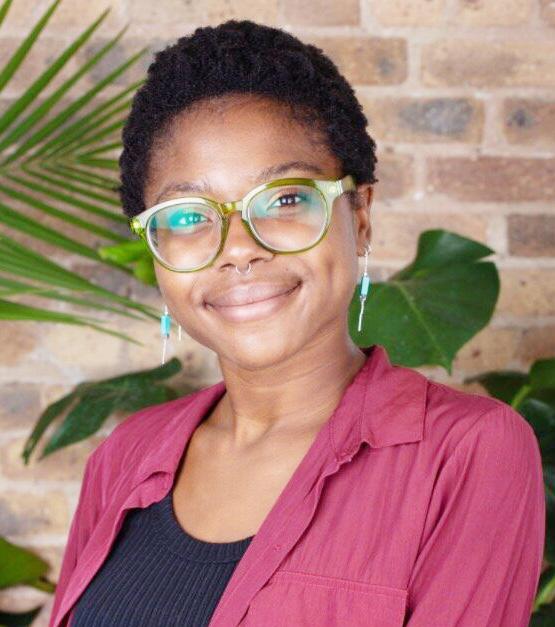

not feeling like my best self.”
“It took me coming into my internship in my last year of my program to set boundaries. They forced me to do self-care and wouldn’t allow us to work more than 45 hours,” said Bryan. “They were really intentional about teaching us how to sustain ourselves. I noticed a huge difference in terms of my energy around the people I love, I had more space to hold for people and I was happier.”
It was noted by Estes that one of the most important parts of setting a boundary is enforcing it with yourself. She explained that you can’t force other people to prioritize or respect your boundaries, but standing firm within them regardless of other people is a great way to assure they are followed.
organization, and with it being so near and dear to my heart, this is personal for me. But I have to constantly set boundaries because it’s easy for me to overly dedicate myself.”
Often misunderstood and incorrectly interpreted, a lot of people on the receiving end of a boundary mistake the self-care tool as an indicator that someone doesn’t want a relationship with them anymore. However, Estes explained that it’s actually quite the opposite and it should be seen as a tool to help create and maintain healthy relationships
“I’ve learned to be okay with the fact that no one else is obligated to respect my boundaries. But in return, I’m not obligated to give them my company. I know that my needs are valuable.”
“The work that I do is really heavy and it’s tiring and it can often take the last of what you have to give. In order to respect the boundaries that I put in place to protect my own needs, I put [work] on the shelf once the work day is over,” she explained. “As the founder of this
“I think people hear the word ‘boundary’ and it feels like you’re constricting them to a certain space and they can only move in a certain way. But boundaries mean that I love you so much and want this relationship so much that I have to enforce what I need for it to work between the both of us. And I’m communicating that because I want this to be a healthy relationship on both ends.”
Ashley Bryan, Psy.D, has an extensive background in boundary setting from both
her personal experiences and the help she’s provided her patients. The mental health specialist shared similar sentiments to Estes, noting that implementing boundaries often saves relationships– not destroy them.
“I often think that boundaries are viewed as a way to push people away but I think that boundaries can be an act of love,” said Bryan.“If you care about someone enough to set that boundary then that means you’re willing to put a tool in place so that you can work on that relationship. Without boundaries relationships can blow up.”
Similar to Estes, Bryan also works in a field that is extremely personal, thus making her more likely to take on the baggage of her clients. The young professional recalled how strenuous her workload was as a student until she was both shown and encouraged to set a boundary in her professional life.
“While being a psychologist is a beautiful profession, it can also take a toll on you because you’re absorbing everyone’s stories and experiences. I didn’t learn how to set boundaries throughout grad school,” she said. “I don’t think the model of grad school allowed for that. I found myself pushing myself which led to a lot of burnout and me
“I will honor my needs, I will honor my boundaries. I can not make anybody else in this world respect my boundaries. And I’ve learned to be okay with the fact that no one else is obligated to respect my boundaries,” she said. “But in return, I’m not obligated to give them my company. I tell people all the time ‘ my love is unconditional, my presence is not,’ and there are people I will love until the day I die but they’ll never see me in person again. I love that I’ve gotten to a point in my life where that’s how much my needs matter to me. I know that my needs are valuable.”
Just as setting boundaries can be empowering, having them enforced with you can be hard. Bryan provided advice for those who are on the receiving end of a boundary enforcement, encouraging them to look at the situation and to be mindful that it might not be about you as an individual but the dynamic of the relationship.
“I would encourage those folks to take a step back and think ‘Why is this person setting a boundary with me? Does this have to do with me? Does it have to do with them ?’ Also, remind yourself that if this person is willing to have a conversation around setting a boundary there’s some level of care that they have for this relationship,” she said.
“Sometimes it’s not always a reflection on you,” Bryan continued. “And if you love this person, taking the time to hear them and see where they’re coming from might be really helpful. Cause while it might not be your intention to make them feel a certain type of way, it still has an impact.”
By Aria Brent AFRO Staff Writer abrent@afro.com
There are many types of therapy to help people overcome or recover from the hardships of life. And although some therapies are practiced by licensed specialists, others are created by people who see a need for non-traditional treatment to be administered.
Some may turn to retail therapy, but that can be taxing on the pockets after a while. Others may search for happiness via travel, but for some, food is the way to heal the soul.
“I remember chopping vegetables for a salad and doing things in the kitchen and at the time, I recognized that that process helped me unwind and calm down and kind of recenter myself at the end of the day,” said Julie Ohana, a culinary arts therapist. “I always knew that there was something to it. Flash forward a number of years later, when I was in graduate school, we had to write a master’s thesis on anything we wanted. I knew immediately that I was going to be writing on how cooking can be therapeutic, and that’s what I did.”
Ohana is the founder of Culinary Art Therapy, a small Michigan based business that’s having a huge impact on participants. With
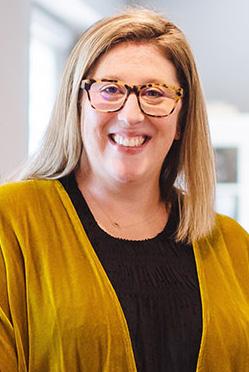
people seek alternative options to traditional therapy and the benefits it provides. Julie Ohana is a culinary arts therapist working to bring more attention to the creative therapy style.
a passion for cooking and over 20 years of experience as a school counselor, Ohana proudly offers her services as a culinary arts therapist.
She explained to the AFRO that culinary art therapy is the act of cooking or creating something for the sake of doing something that feels good for you. She got her start in her family’s kitchen and has never looked back. Much like her passion for cooking, her desire to help people has always been within her and marrying the two came very naturally.
“Wanting to help people has always been in me. I think I always knew I was going to be a therapist, and I always knew I wanted to be somebody that helped other people,” she said. “Food is something that brings people together and it’s something that people can relate to and because of that, I just knew that it would be something that other people would be receptive to and could benefit from.”
She noted that there aren’t currently any culinary art therapy programs or degrees in the U.S., however the practice is constantly
It was noted that culinary art therapy has been found to be beneficial to people of all backgrounds, ages and genders. Ohana explained that a singular session is all some patients need to put them in a better space, however much like traditional therapy its most useful when it’s practiced regularly.
“It works across the board.
It’s great family therapy.
There’s nothing more amazing than seeing family dynamics play out as a family’s cooking together,”Ohana said.
“I’ve been known to bring vegetables into my office and we chop them together to be
“Pick a recipe that is simple–something that appeals to you. This is not about creating Michelin star restaurant quality dishes, this is about engaging in the process.”
growing and more people are participating in the creative style of therapy.
“There are culinary art therapy programs in other countries around the world, like Israel. I hope that one day in the U.S., it will be the same but for right now, it’s not the case. I did put together a training program to help other clinicians learn how to utilize these skills in their practice,” she said.
able to learn how to practice mindfulness, how to self soothe and ease some anxiety symptoms.”
“It’s also really powerful for older adults, who can reap the benefit of tapping into that ability of reminiscing and memory, because our sense of smell is the strongest sense tied to memory,” she said “When you’re cooking or you’re even talking about certain dishes, it evokes
memories, and there can be something really cathartic about being able to look back and talk about those memories with someone.”
And although culinary art therapy is great when practiced by a professional, it can also be done at home by regular people who have a passion for food and cooking.
“Pick a recipe that is simple–something that appeals to you. This is not about creating Michelin star
restaurant quality dishes, this is about engaging in the process,” said Ohana.
“Open your refrigerator, pull out whatever veggies you have and start chopping and start being aware of what you’re doing. Think about how you’re feeling and pay attention to what you need to improve on. Ask yourself, ‘Where do you need help?’ and ‘How do you tune into those things?’ and let that process guide you.
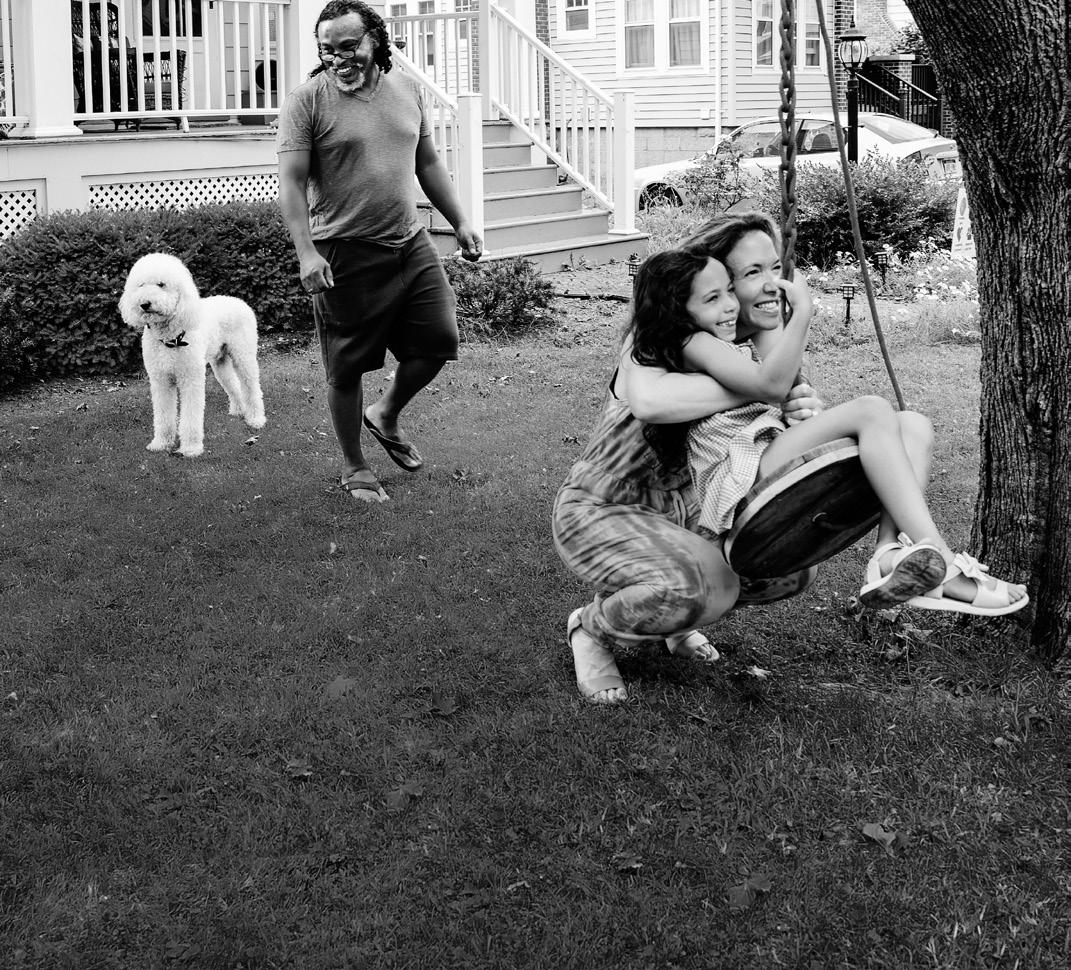

By Megan Sayles AFRO Business Writer msayles@afro.com
After suffering four heart attacks and facing open heart surgery, former educator Tawanda Prince was told her heart functioned at just 25 percent of its normal capacity. The news transformed her world completely.
“Activities
As an entrepreneur herself, Prince understands the tribulations that come with running a business. The AFRO recently connected with Prince to learn how business owners can stay motivated and enhance their wellness.
What sort of toll can running a business have on people?
Surviving the health scare led Prince to consider her mission in life. Through reflecting, she determined it was to help others identify, understand and live out their own purpose. In 2012, she became a certified life coach and began showing people how to find “the good life.”
change, but purpose doesn’t.”
“Activities change, but purpose doesn’t. It just manifests differently,” said Prince. “Today, I might be doing this, and tomorrow, I might be doing that, but it’s still the same mission and purpose.”
Since taking on the moniker, the ‘Good Life Coach,’ Prince has published several motivational books and led visionary, leadership, career, relationship and transitional coaching sessions for individuals and organizations.
Running a business is definitely not for the weak. You have to know that this is what you are called to do. If you are not operating in your divine purpose, then you’re swimming upstream. That’s not to say you can’t get it done, but if it’s not what God is calling you to do, you won’t prosper in the way that you should. When I say prosper, I don’t just mean that you have a lot of money. It’s about your whole self prospering and flourishing.
You have to learn what you need to know to run your business, and then find the people you need to know to run it. You need connection and support. No person is an island.
How can entrepreneurs take part in self-care and manage their wellness?
You have to know when enough is enough. You have to build time for recharging and rejuvenating yourself. I make every effort to not do any business on Sunday. I don’t look at emails or take
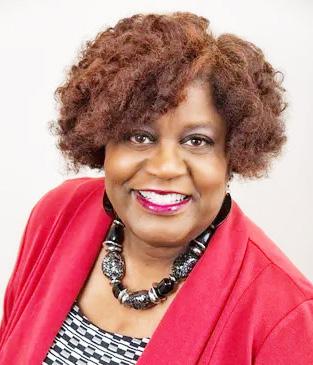
your health, your wealth, for yourself and for someone else. By practicing that, you maintain balance. Health could be exercise, having a cup of herbal tea, breathwork, managing your diet or taking your medications. Wealth is not just getting a bag, but also taking care of administrative tasks and managing your personal finances. Self-indulgence could be taking an extra long shower, shopping, eating with friends or even going on a date with your partner.
Another simple thing is journaling. This is something I do on a daily basis. It’s therapeutic because it gives you a chance to capture everything that’s going on in your life. You can break down your day and write about the things you’re grateful for.
What tips would you give entrepreneurs for staying motivated?
business phone calls unless it’s a situation where it absolutely cannot be avoided. You should also indulge in things that bring you happiness. I’m also an artist. I have an art studio in my home that is my happy place. You have to find things that bring you peace and joy and engage in them.
I teach my clients that each day, you need to do something for your house,
Use vision boards. Put the things you want to achieve on a goal poster along with motivational sayings or scriptures. You should also share your goal with the people who matter. That way there’s accountability and encouragement.
Know that this is what you’re supposed to be doing. That helps me to continue on and stay the course even when I’m struggling. You should also keep track of what you’ve accomplished so far. That will become the motivation for the things you pursue in the future.
More U.S. schools are taking breaks for meditation– teachers say it helps students’ mental health
By Sharon Johnson The Associated Press
The third-grade students at Roberta T. Smith Elementary School had only a few days until summer vacation, and an hour until lunch, but there was no struggle to focus as they filed into the classroom. They were ready for one of their favorite parts of the day.
The children closed their eyes and traced their thumbs from their foreheads to their hearts as a pre-recorded voice led them through an exercise called the shark fin, part of the classroom’s regular meditation routine.
“Listen to the chimes,” said the teacher, Kim Franklin. “Remember to breathe.”
Schools across the U.S. have been introducing yoga, meditation and mindfulness exercises to help students manage stress and emotions. As the depths of student struggles with mental health became clear in the aftermath of the COVID-19 pandemic, the U.S. Centers for Disease Control and Prevention last year endorsed schools’ use of the practices.
Research has found school-based mindfulness programs can help, especially in low-income communities where students face high levels of stress or trauma.
The mindfulness program reached Smith Elementary through a contract with the school system, Clayton County Public Schools, where two-thirds of the students are Black.
GreenLight Fund Atlanta, a network that matches communities with
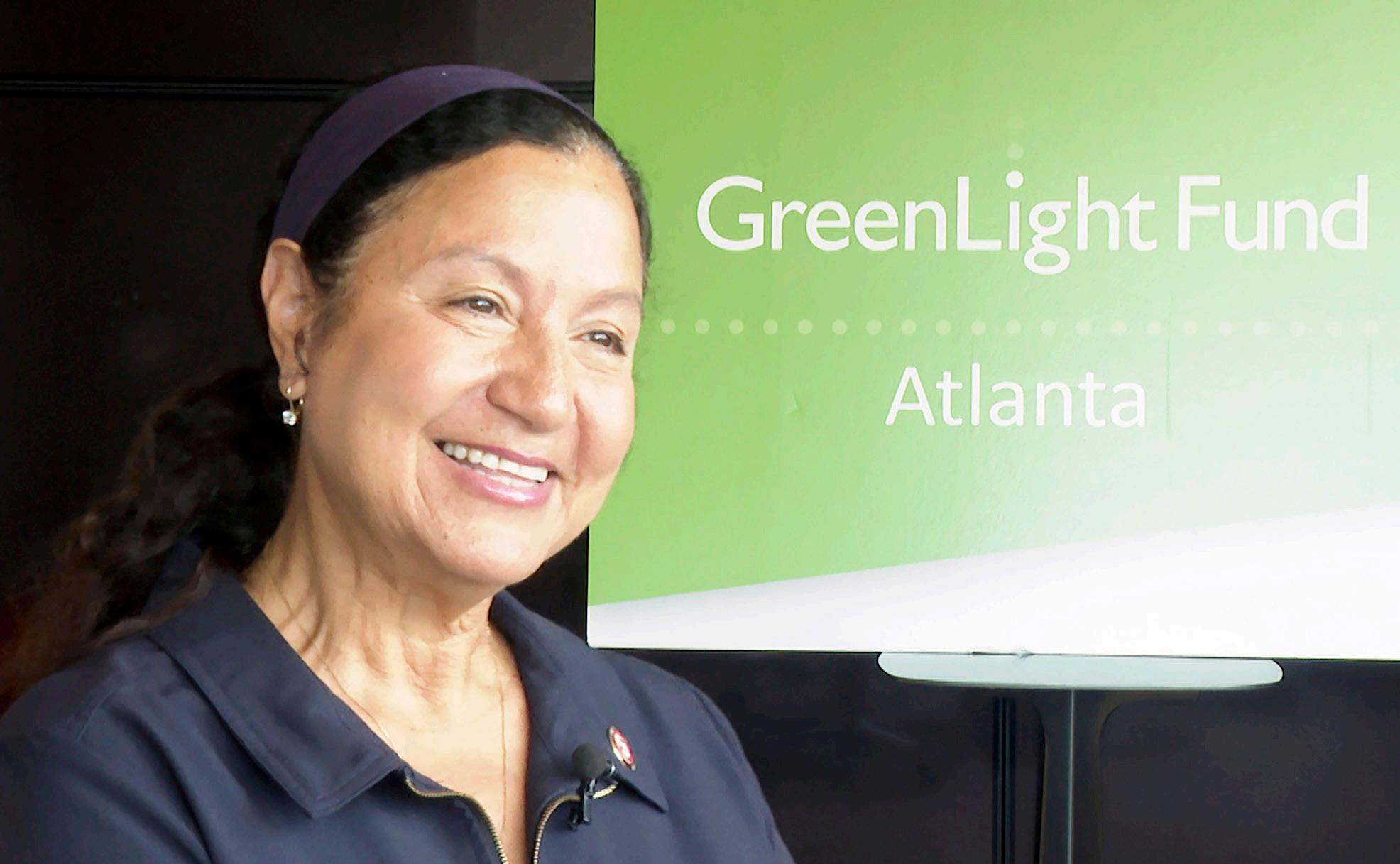
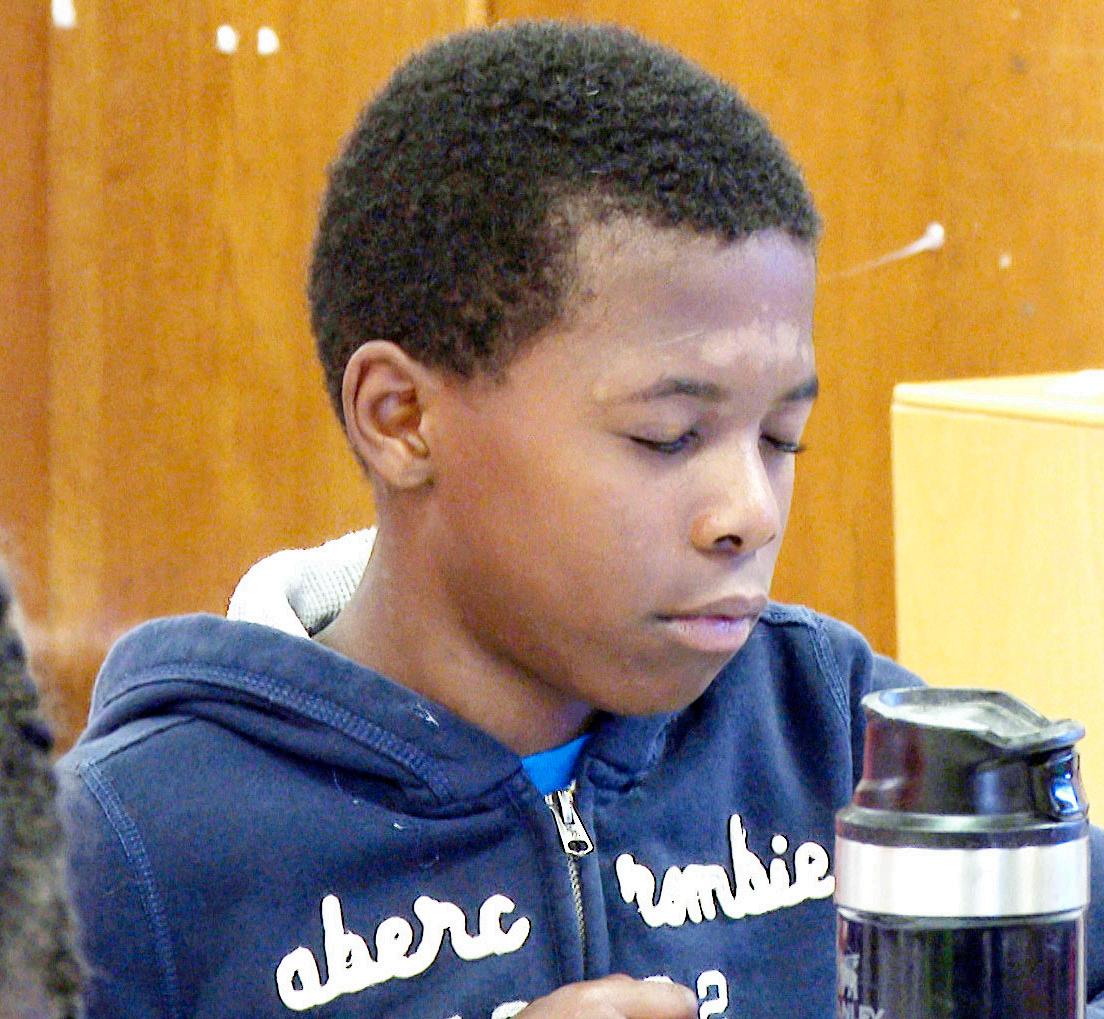

local nonprofits, helps Georgia school systems pay for the mindfulness program provided by Inner Explorer, an audio platform. Joli Cooper, GreenLight Fund Atlanta’s executive director, said it was important to the group to support an organization that is accessible and relevant for communities of color in the Greater Atlanta area.
Children nationwide
struggled with the effects of isolation and remote learning as they returned from the pandemic school closures. The CDC in 2023 reported more than a third of students were affected by feelings of persistent sadness and hopelessness. The agency recommended schools use mindfulness practices to help students manage emotions.
“We know that our
teenagers and adolescents have really strained in their mental health,” CDC Director Dr. Mandy Cohen told The Associated Press.
“There are real skills that we can give our teens to make sure that they are coping with some big emotions.”
Approaches to mindfulness represent a form of social-emotional learning, which has become a political flashpoint with
many conservatives who say schools use it to promote progressive ideas about race, gender and sexuality.
But advocates say the programming brings muchneeded attention to students’ well-being.
“When you look at the numbers, unfortunately, in Georgia, the number of children of color with suicidal thoughts and success is quite high,”
“I love myself how I am, but Inner Explorer just helps me feel more like myself.”
Cooper said. “When you look at the number of psychologists available for these children, there are not enough psychologists of color.”
Black youth have the fastest-growing suicide rate among racial groups, according to CDC statistics. Between 2007 and 2020, the suicide rate among Black children and teens ages 10 to 17 increased by 144 percent.
“It’s a stigma with being able to say you’re not OK and needing help, and having the ability to ask for help,” said Tolana Griggs, Smith Elementary’s assistant principal. “With our diverse school community and wanting to be more aware of our students, how different cultures feel and how different cultures react to
things, it’s important to be all-inclusive with everything we do.”
Nationwide, children in schools that serve mostly students of color have less access to psychologists and counselors than those in schools serving mostly white students.
The Inner Explorer program guides students and teachers through fiveto-10-minute sessions of breathing, meditating and reflecting several times a day. The program also is used at Atlanta Public Schools and over 100 other districts across the country.
Teachers and administrators say they have noticed a difference in their students since they’ve incorporated mindfulness into their routine. For Aniyah Woods, 9, the program has helped her “calm down” and “not stress anymore.”
“I love myself how I am, but Inner Explorer just helps me feel more like myself,” Aniyah said.
Malachi Smith, 9, has used his exercises at home, with his father helping to guide him through meditation.
“You can relax yourself with the shark fin, and when I calm myself down, I realize I am an excellent scholar,” Malachi said. After Franklin’s class finished their meditation, they shared how they were feeling.
“Relaxed,” one student said.
Aniyah raised her hand.
“It made me feel peaceful,” she said.


Germano Gomez, Managing Director of The Harbor Bank of Maryland Community Development Corporation
What is your role at The Harbor Bank of Maryland Community Development Corporation (“CDC”)?
I am the Managing Director of The Harbor Bank of Maryland Community Development Corporation (“CDC”). And what that means is that I oversee the strategy and operations for the CDC; specifically, I support the real estate development platform.
Although I’ve been at the CDC for 6 years, it feels like a lifetime, because really, all of my career and experience has culminated into this position. Through my 20 years in the industry, as a real estate developer, I’ve offered technical assistance, education, and owners’ representation for minority real estate developers and minority-owned projects throughout the city.
How does the CDC correlate with The Harbor Bank?
The CDC is the nonprofit affiliate of The Harbor Bank of Maryland.
There are four entities that are affiliates with Harbor Bankshares Corporation; The Harbor Bank of Maryland, Harbor Bank Community Development Entities, which focus on New Market Tax Credits, Harbor Bankshares Capital Corporation, which is a private credit and asset management affiliate, and the Harbor Bank CDC, which is a public charity engaged in economic and community development.
The CDC complements the Bank’s services by providing support to borrowers. We also support future borrowers by helping them get their financial situation aligned before they go over to the Bank. Our affiliation with Harbor allows us to create a path so the Bank doesn’t have to turn anyone away who’s trying to gain support for their business. If they can’t be qualified for services through the Bank, they’re ultimately referred to the CDC for assistance. This is key to our community’s development because we have been traditionally locked out of capital, access to capital, investment capital, and venture capital. Furthermore, the CDC doesn’t lend money without technical assistance because we realize that may put the borrower in a bad position; we try to look at our clients holistically. Our technical assistance is one of the things that make us unique because we can not only lend and/ or invest in entrepreneurs, but then we can follow it up with assistance to make sure their endeavors are successful.
Tell us about some of your biggest initiatives.
On the real estate development side, one of our biggest initiatives is the Emerging Developers Program (“EDP”), which is a 15week, soup-to-nuts, commercial real estate development overview course. The main benefit of the program is that we teach students the correct process, methods, and strategies of real estate development, we are essentially creating new minority-owned development companies. The one thing
that most minority-owned developers don’t have: experience. So, to come to this class and benefit from my experience freely, is tremendous for our students.
Secondly, we’re creating quality housing. We set standards for the Emerging Developers. We don’t create slumlords. There is a rule that you cannot rent an apartment that you yourself wouldn’t sleep in.
Why is the Bank and CDC so important to Baltimore?

So, we are creating and maintaining integrity amongst the minority real estate development world because we are the ones who are developing our community.
Lastly, we are deepening relationships with the Bank. People come through a lot of times, and their first connection with Harbor is through EDP, and the whole goal is that they come to get technical assistance and then qualify for funding through the Bank. The Emerging Developers Program has had 280 graduates so far in 10 cohorts, which I’m really proud of.
Can you describe the history of the Haskins Center and the goal or principles it was founded on?
The Joseph Haskins Jr. Center for Community and Economic Development, also known as the Haskins Center, was developed in 2017 after the Freddie Gray uprising. One of the needs that the community expressed was a safe space for social entrepreneurs to address the needs of the Black community in Baltimore City. So, our CEO & President John Lewis, and former CDC, Vice President, Calvin Young, got together with community organizations and entrepreneurs such as, Leaders of a Beautiful Struggle, Black Girls Vote, and Project Pneuma. Collectively, they came up with the idea to create a coworking space here at the Haskins Center that organizations could operate from and share their common goal of responding to all of the outpour of anger that came from the Freddie Gray uprising. From there the Haskins Center opened on January 1st, 2018. There have been 50-plus tenants that have rotated through here in the past six years. Two of the original tenants are still here, Project Pneuma and Black Girls Vote.
The core principles behind the CDC are that Harbor Bank wants to wrap its arms around entrepreneurs to make sure they’re successful. Having organizations here on-site puts them in direct contact with resources and technical assistance all the way up to John Lewis. So, they have access to not only me as the Managing Director, but they also have access to the CEO & President.
What are you most proud of doing in your role?
I’m most proud of helping people. My goal in life is to be able to use my knowledge and resources to help push others forward. When I look back at the number of businesses that I’ve come into contact with over the past six years it’s over 1,000! Having the opportunity, the tools, and the platform that Harbor Bank affords me to help our community is one of my biggest accomplishments and my main goal.
What would you say are the specific current goals of the CDC moving forward?
One is to expand our entrepreneur technical assistance platform through the Black Founders Table and Black Tech Saturday activities. The Black Founders Table is an extension of the work that we’re doing with the Equity Brain Trust. They are wrapping their arms around 12 Black tech company founders in order to move the needle on how venture capital procurement and inclusion are handled and managed for minorities in Baltimore City. The other goal is to invest in, build, finance, construct, own, and manage commercial real estate for the benefit of the CDC operations and the communities in which the projects are located.
Well, we are the last minorityowned, Black-owned financial institution headquartered in the state of Maryland; and the only commercial bank founded and headquartered in Baltimore City. We are important to this city because traditionally, systematically, and legislatively, Black Baltimoreans have been denied access to capital, ownership rights, healthcare services, and community amenities. We are in the spirit of the Bank’s origin, which was to provide loans to businesses and individuals because they couldn’t get loans from other financial institutions.
That has evolved into the deployment of $500 million in New Market Tax Credits in key areas of the city. So, we’ve taken $2.6MM in capital in 1982, to now having created billions of dollars of economic impact to grow our communities. That’s why we’re all important, we want to continue being a part of the change that we want to see.
Is there anything coming down the line as far as events, campaigns, programming, or initiatives that you would like to alert the readers to?
We have several things on the
entrepreneurial side, look out for Black Tech Saturdays! Our last event had over 200 people in attendance so the momentum is great. We’ll continue to support it, but we’re happy to see that it has now garnered support from state legislators, city government, and some other private philanthropists. So, we’re looking for that to really grow. Also, I would say look for bigger real estate development projects. We received a Department of Housing & Community Development (DHCD) Project C.O.R.E. grant of $250,000 for a 50-unit, mixed-use building that we’re doing in partnership with Okoro Development. Additionally, we are supporting Coppin State’s “Live Near Your Work” initiative with 13 single-family lots that are under contract to be renovated for faculty. The initiative provides down payment assistance to compensate employees, nonprofit workers, and all state employees who want to live in these homes. If we can continue our partnership, I think we’d want to be responsible for building up Coppin State and its surrounding areas, similar to how Morgan State and Johns Hopkins has grown and flourished throughout the years. We want to see some equity in West Baltimore for such a prestigious and valuable institution for the Black community. Long term, we want to create housing opportunities, community amenities, and retail opportunities, for the residents and businesses on the West side of Baltimore as well.
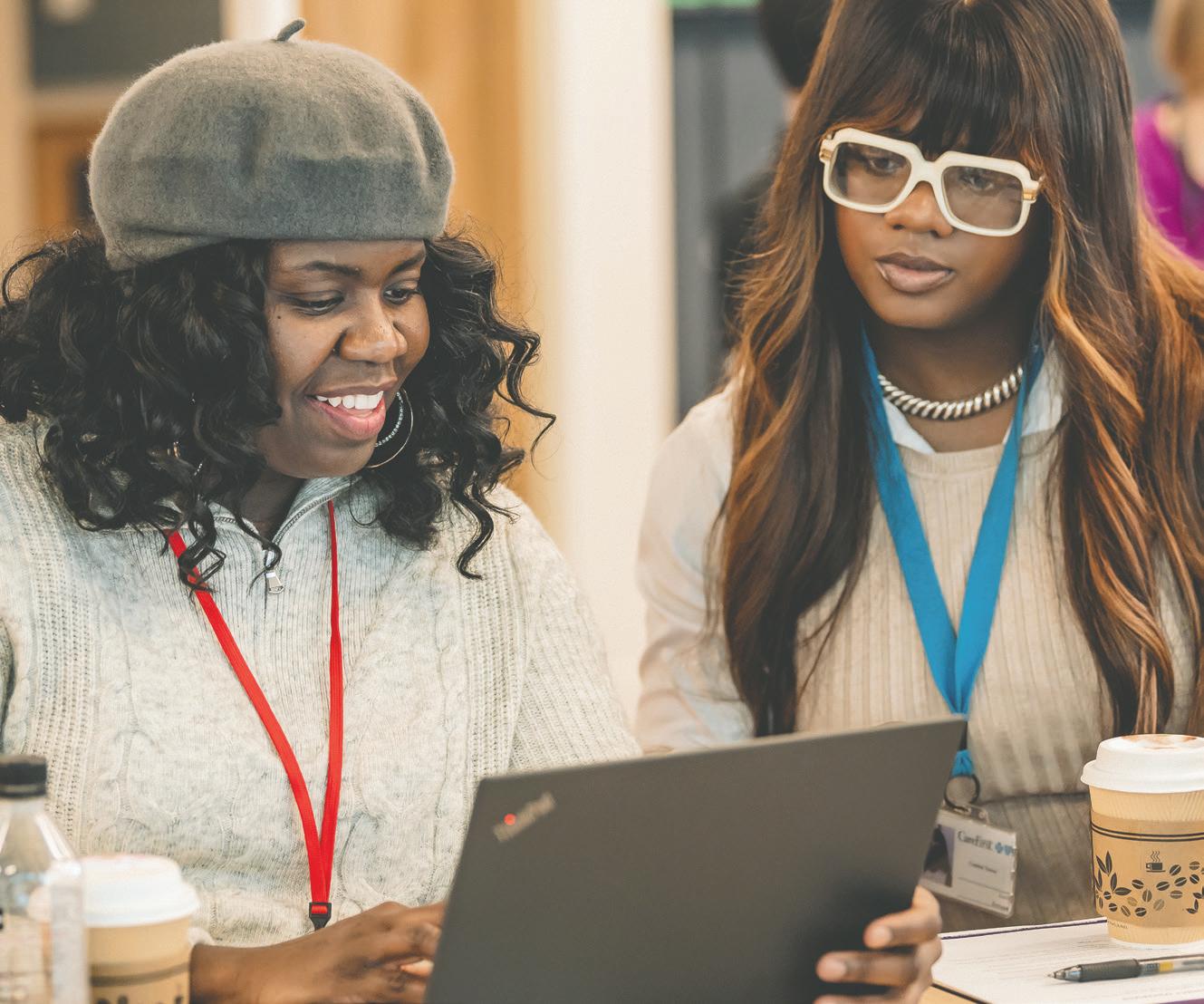
One partnership at a time. Together, we are a force for good. That’s why we invest in partnerships that advance equity in local Black communities by improving access to educational opportunities, healthcare and mental health support.


By Megan Sayles AFRO Business Writer msayles@afro.com
At 86 years old, Hazel Cropper is a mother, grandmother and world champion crab picker. The crustaceans are a staple in Maryland, her home state, and she learned to pick them from her grandmother when she was just nine years old. Over the years, Cropper, who’s affectionately known as “Hurricane Hazel,” learned how to crack and clear a crab of meat in record-breaking time.
Her family has a long history of crab picking. Some of her relatives were a part of the 1938 strike, in which 600 crab pickers— who were predominantly Black women— walked out of their jobs after packing houses in Crisfield, Md. announced wage cuts.
“I’m no stranger to work,” said Cropper.
She continues to pick crabs to this day. Cropper acknowledged that many older adults are set in their routines. She urged them to find ways to stay active.
“If you sit down, at my age– you’re going to stay down. Sitting will kill you. Find something to do, and keep yourself motivated. I’m not going to sit down, as long as God tells me I can go.”
“If you sit down, at my age– you’re going to stay down,” said Cropper. “Sitting will kill you.”
Sedentary lifestyles pose risks to all people. They increase the risk of cardiovascular problems, lead to muscle deterioration, slow down your metabolism and stifle mobility
Some studies have even linked prolonged inactivity to shorter life expectancy.
“Find something to do, and keep yourself motivated,” said Cropper. “I’m not going to sit down, as long as God tells me I can go.”

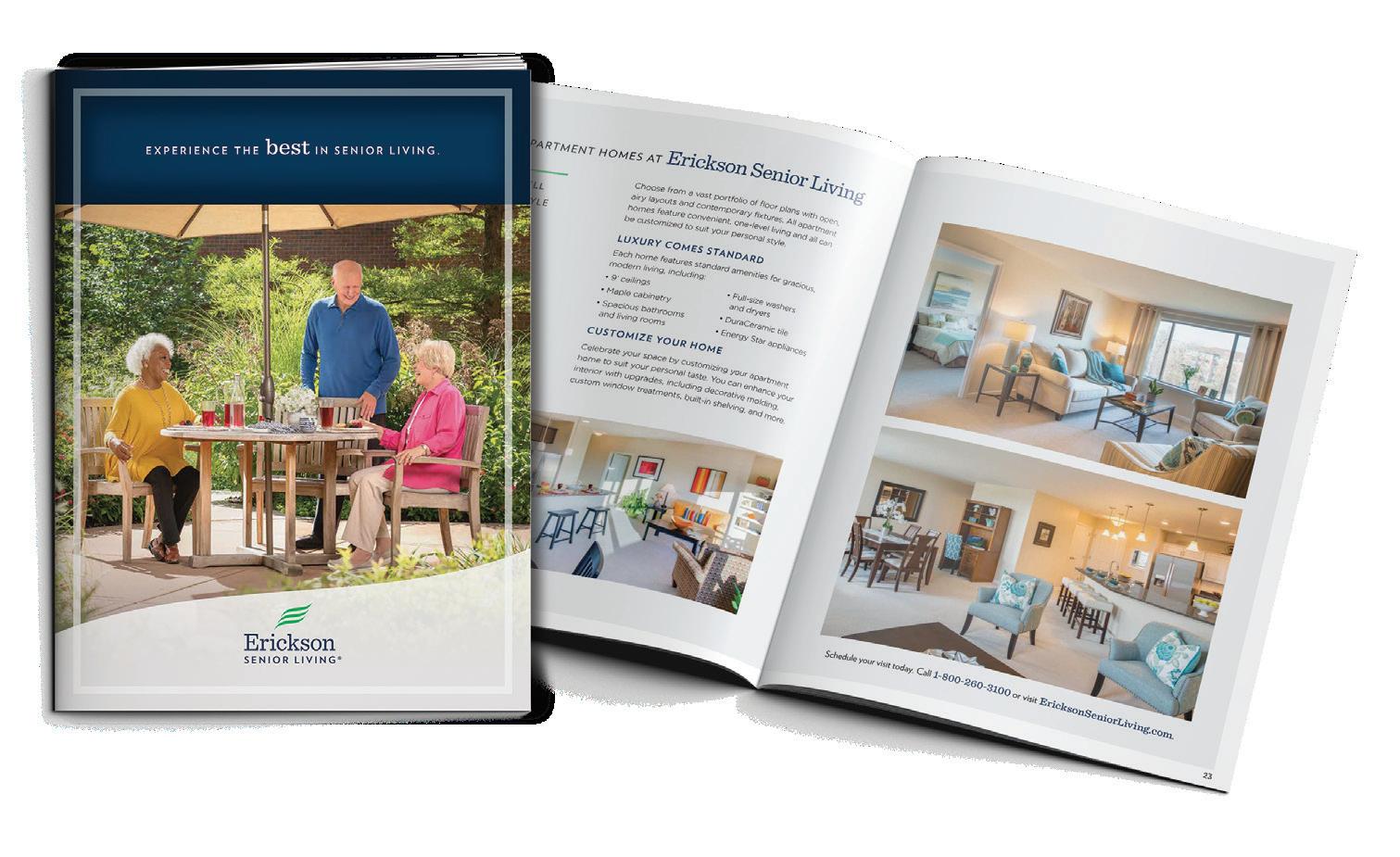

By J. Pamela Stills Special to the AFRO
On Sept. 10 the City of Alexandria, Va. honored its residents who are or will be 100 years old or older by Dec. 31. The centenarian ceremony, held at Alexandria City Hall, brought together city employees, loved ones and guests to join in the celebration.
Thirteen centenarians made the roll in 2024: Lois Madolyn Cross Brooks, 100 years old; Dorothea G. Campbell, 101; Jose Croll, 101; Addie Lee Foster, 102; Mediha Frank ,100; Charles F. Funderburk ,101; Walther A. Hammersley, 102; Virginia Hoge, 100; Florence Katz ,100; Marjorie “Peggy” Knowlton, 101; Jane Sara, 104; Alice Schmidt, 104, and Donna Hamilton Shor, 100.
Kate Garvey, director of the Department of Community and Human services, provided opening remarks. Alexandria Mayor Justin Wilson, gave congratulatory remarks and presented the in-person attendees with a certificate and city coin. A musical performance was delivered by the Alexandria citizens band. Two of the four inperson attendees were Lois
Madolyn Cross Brooks and Charles F. Funderburk. Lois Madolyn Cross Brooks is the last surviving member of nine siblings. Mrs. Cross Brooks has one son, two grandchildren and five greatgrandchildren. She was accompanied to the ceremony by her granddaughter LaJuanne Russell. Mrs. Cross Brooks enjoys reading, interacting with youth, keeping up with political happenings, traveling and is actively engaged working in her granddaughter’s firm, Business Management Associates. Mrs. Cross Brooks shared some secrets to her longevity which includes
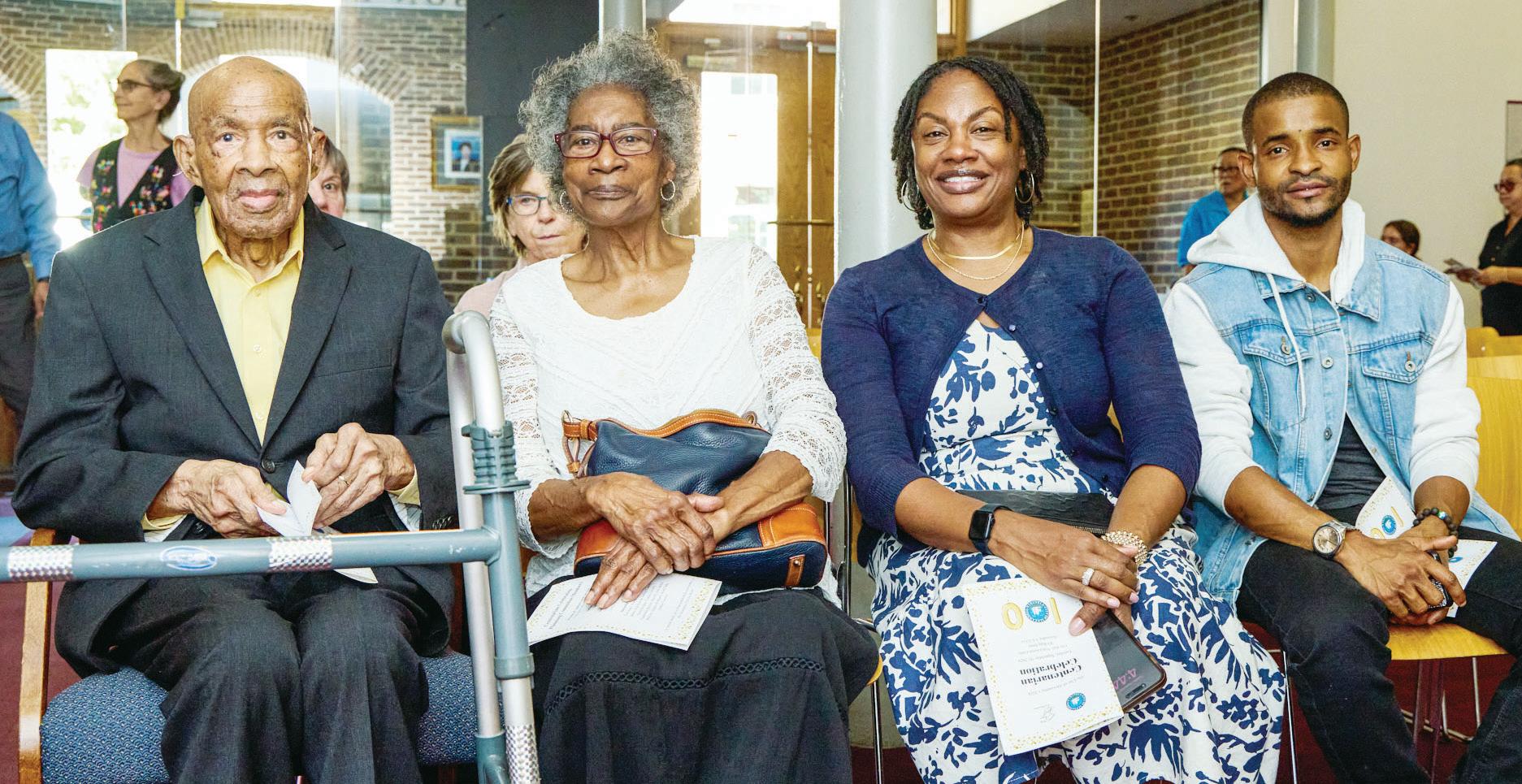
fresh food, plenty of rest and enjoying an indulgence–hers being a Krispy Kreme raspberry-filled donut every day.
Charles Funderburk served in the Civilian Conservation Corps under President Franklin D. Roosevelt. He settled in Alexandria in 1946, working for the St. Agnes School Board. He would later be employed by the Mount Vernon Ladies Association (George Washington Estate), working for almost 50 years until his retirement. Mr. Funderburk has four children and was accompanied by his daughter Jane Funderburk, granddaughter Clarissa Winslow and family friend Franklyn Bundu. In attendance at the ceremony, Judge Nolan Dawkins, retired. Judge Dawkins was one of five Black students to integrate the former George Washington High School. He later became the first Black judge in Alexandria in 1994, starting in juvenile and domestic relations court, a court where “you can make a difference.”
Judge Dawkins retired from the bench in June 2020.




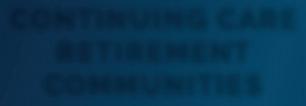
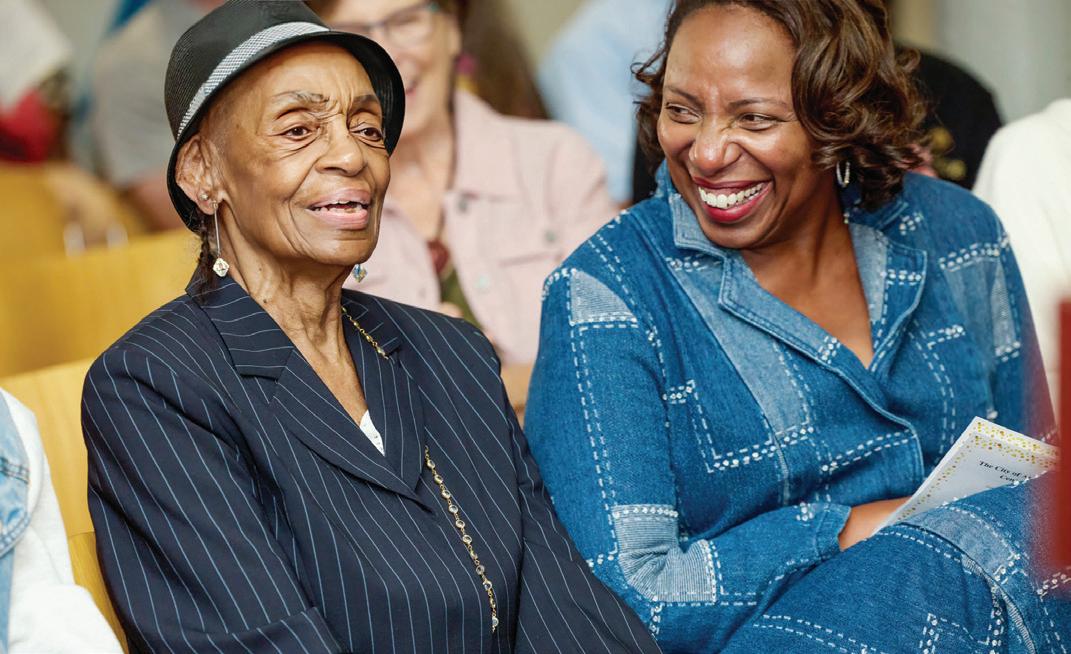
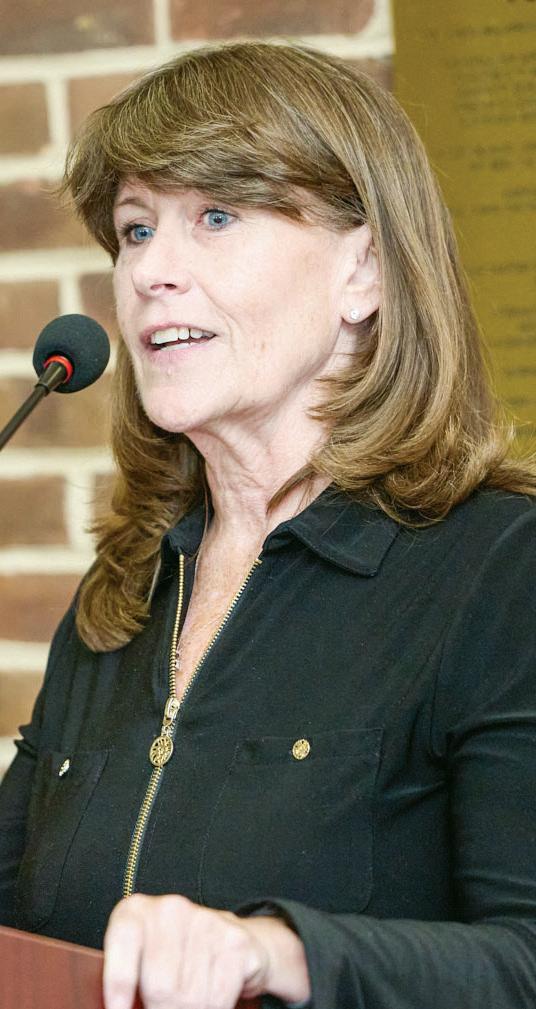
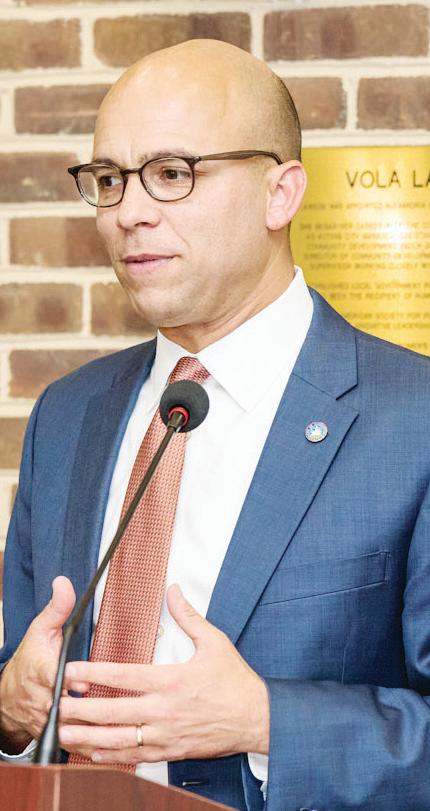
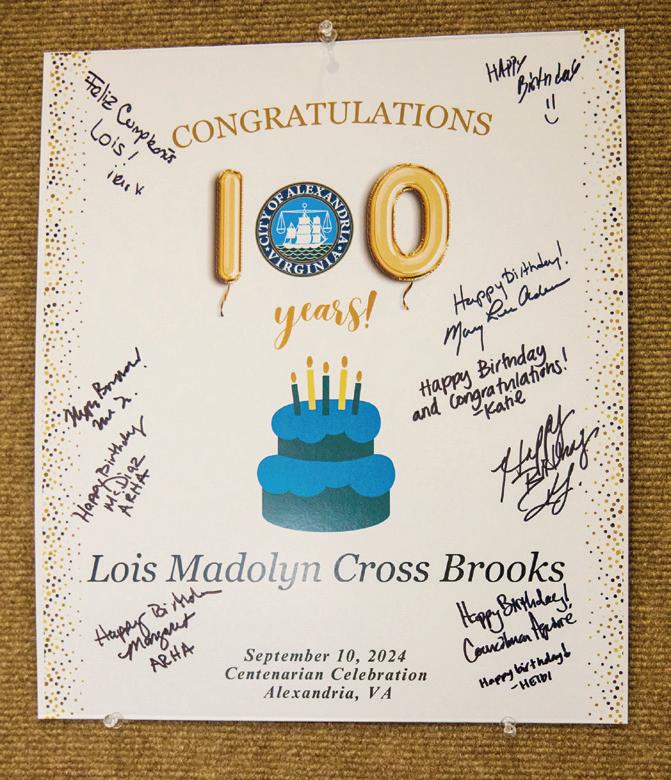

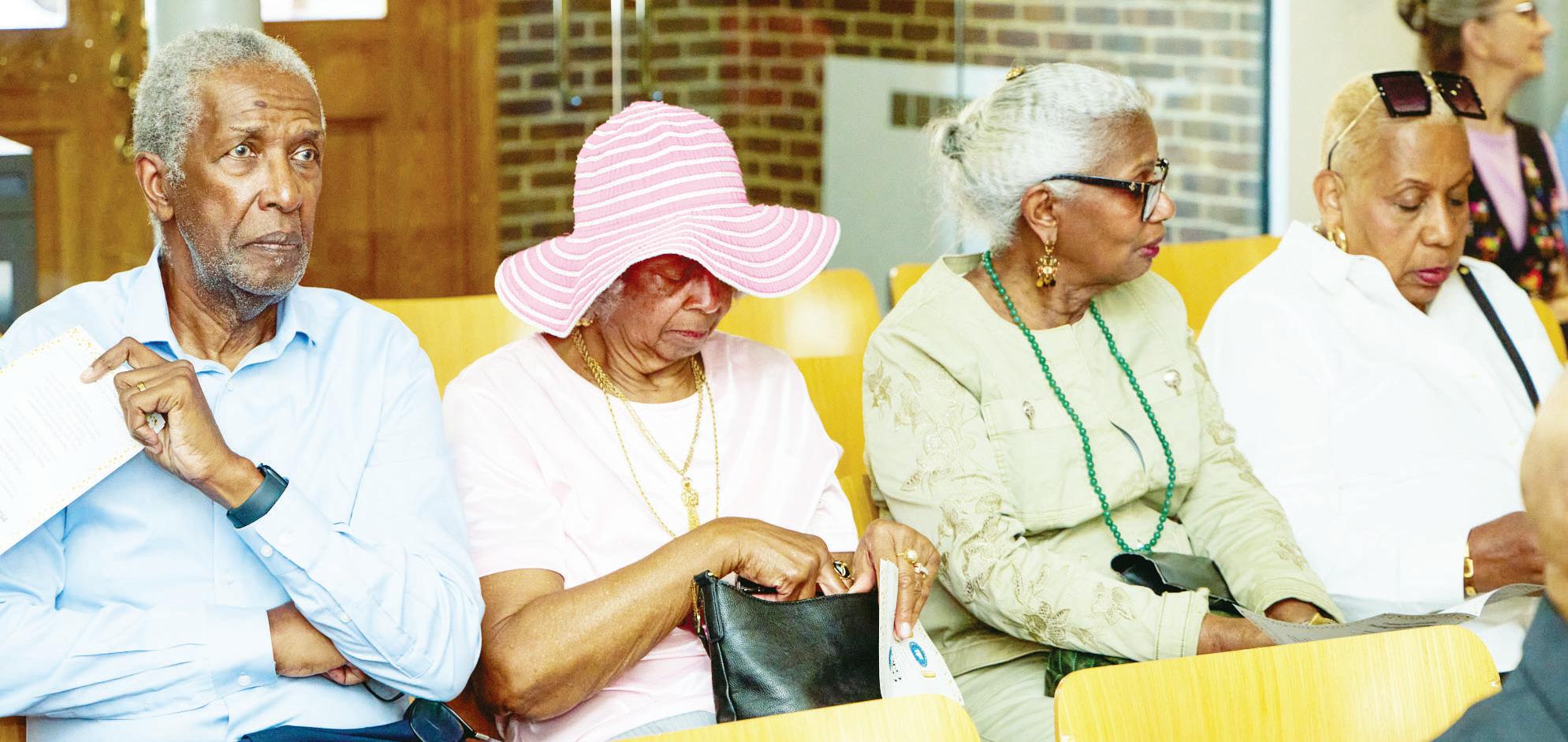








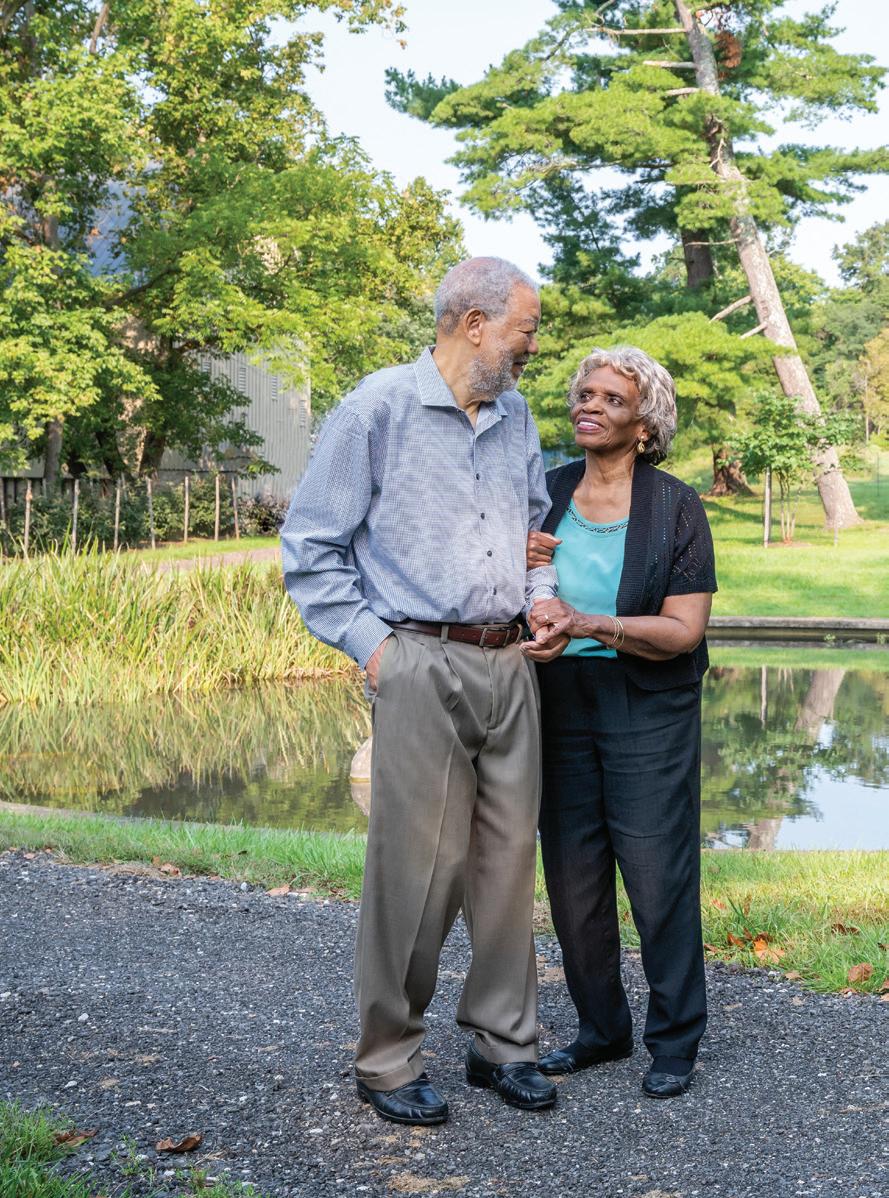


By Nijiama Smalls
The Black Girl’s Guide to Healing Emotional Wounds
I was meeting with the two IT guys who help me keep my virtual space intact when one of them began to share his mental health journey. The meeting then turned into a healing session. Both of these Black men shared that they have suffered from panic attacks and
experienced bouts of anger. The stress of putting on a facade regarding their feelings and emotions began to have an impact on their mental health.
Black men have not always had the space to share their feelings. Not only has it been frowned upon, but it has been weaponized. Let me keep it 100 and say that
I have done this myself.
I have proudly boasted about the fact that my
husband was emotionless.
I put his ability to compartmentalize on a pedestal as if it made him superior to men who showed their emotions.
I referred to men who did show emotions by demeaning names (sissy, weak, b@#$%made). I was a toxic hot mess. Then, my husband began to suffer from panic attacks.
I realize that I had been conditioned to believe that, in essence, a man
who stuffs his emotions is the picture of masculinity. Truth is, the behavior I was celebrating is harmful.
Suffering in silence leads to stress and depression which are linked to hypertension and heart disease. Our attitude towards Black men sharing emotions is literally killing them.
Moreover, instead of healing, many men learn to mask their internal pain by hiding behind anger and

By Nijiama Smalls
The Black Girl’s Guide to Healing Emotional Wounds
I used to have an issue with forgiveness. I used to hold grudges like no other. I would completely stop speaking to my offender because I wanted to let them know I hated them and no longer “messed with them.”
But here’s what I learned:
Unforgiveness leads to bitterness, which causes one to become endlessly negative and to have an overall cynical outlook on life.
Unforgiveness impacts our overall physical health. Harboring anger, hate and disappointment increases our risk of depression, heart disease and depression.
Here are some questions to ask yourself to see if you are harboring some unforgiveness:
Do you roll your eyes when you hear your offender’s name or see them?
Do you try your best to avoid your offender?
Do you have something negative to say about them when their name is mentioned?
“Unforgiveness leads to bitterness, which causes one to become endlessly negative and to have an overall cynical outlook on life.”
Do you secretly hope something bad happens to them and/or feel they do not deserve good things to happen to them in life?
Do you replay the conversation you had with them in your head dissecting it or wishing you had said things differently?
If you answered yes to any of these questions, it’s time
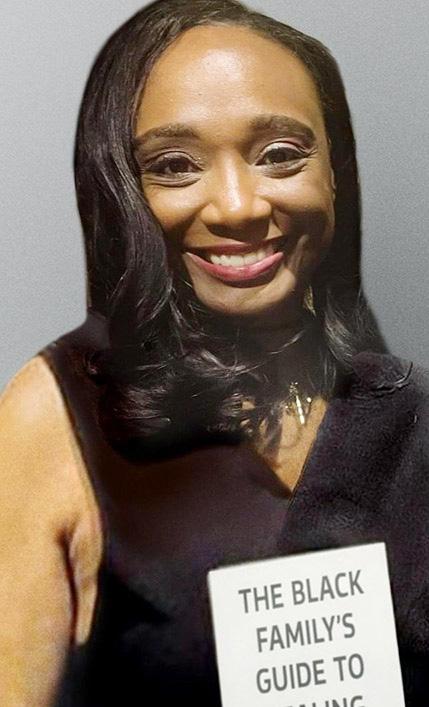
they learn to cope with their trauma by grasping onto vices such as sexual addiction. Womanizing is a behavior embraced by men who are attempting to drown unhealed emotional wounds or to gain a sense of self-worth. We can all be the change for the men in our lives by encouraging our fathers, brothers, husbands, and colleagues to take the journey to heal.
Let’s celebrate when they turn to therapy and display and share their emotions (in a healthy way).
This article was originally published by The Black Girl’s Guide to Healing Emotional Wounds. For more on this topic, read The Black Family’s Guide to Healing Emotional Wounds. Brother circles will be coming soon.


By AFRO Staff
This week, the AFRO celebrates National Self-Care Awareness Month. Do you know what self-care looks like? Take a look at the worksheets below to see how you can incorporate small selfcare tips and tricks into your daily routine.
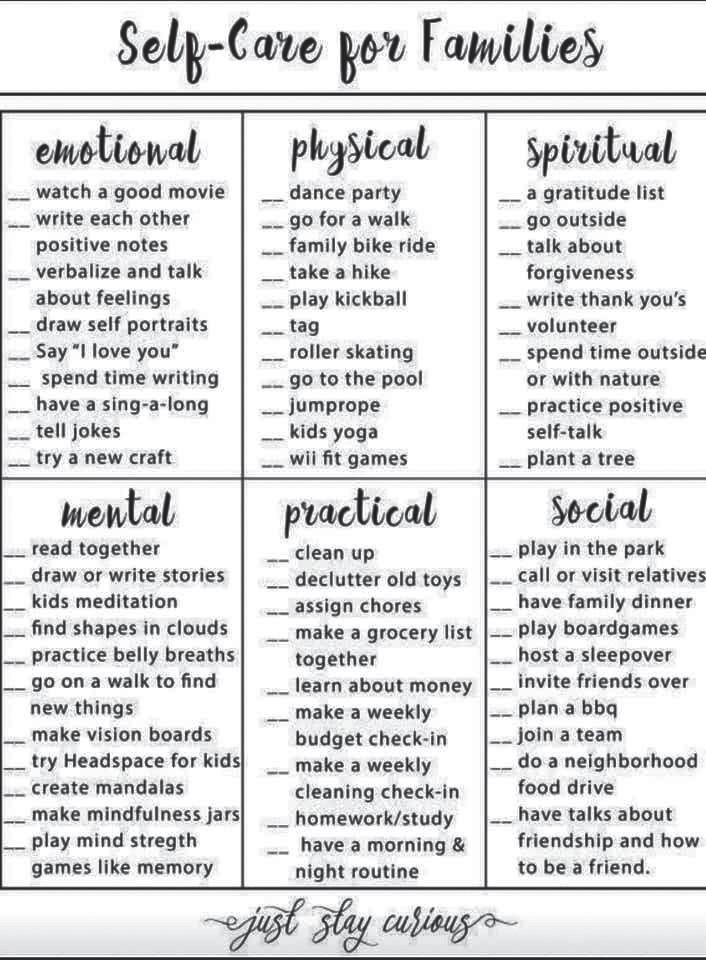
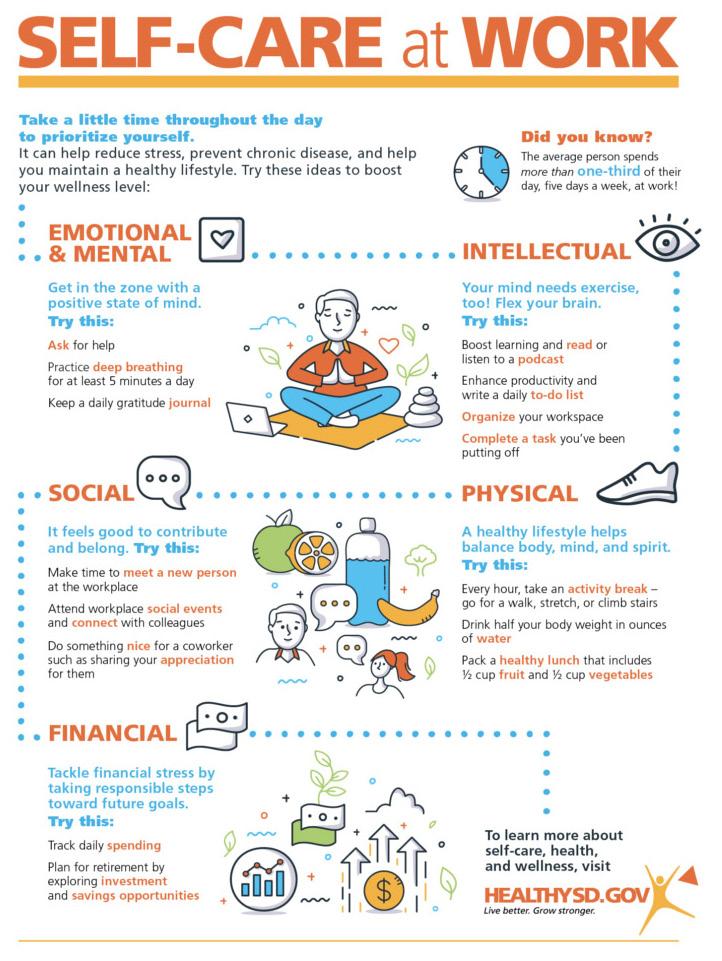
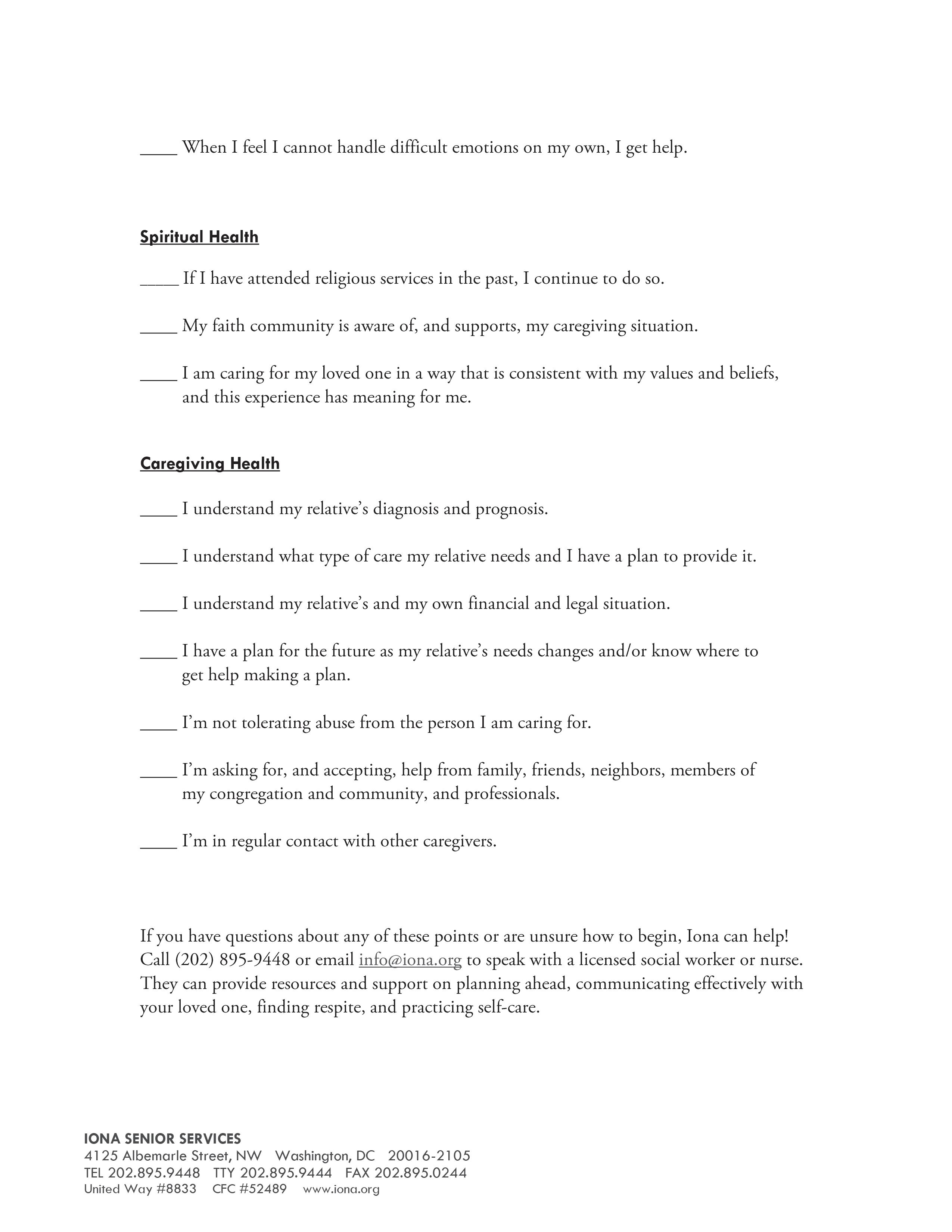
The Family Caregiver Alliance defines an informal “family caregiver,” as “any relative, partner, friend or neighbor who has a significant personal relationship with, and provides a broad range of assistance for, an older person or an adult with a chronic or disabling condition.” According to information released by the Centers for Disease Control and Prevention (CDC), “the number of caregivers increased from 43.5 million in 2015 to about 53 million in 2020.” That means that “more than 1 in 5 Americans,” are providing some type of care for another adult person. In 2030, the CDC says “an estimated 73 million people in the United States will be 65 years or older.” As the population ages, more caregivers will be needed. This week, as the AFRO celebrates National Self-Care Awareness Month, we invite all of the caregivers to complete the self-care checklist. Afterall, you can’t care for others if you don’t care for yourself first!

By Kristen Wegrzyn
The world has faced a dissemblance of normal life in recent years, and whether you have been directly or indirectly affected by the COVID-19 pandemic, chances are high your stress levels are increased. You may feel like you lack control of this situation, and to some extent, that’s true; however, there are strategies you can try to relieve the stress you are experiencing day to day.
One approach is to limit your exposure to your own stress triggers. If having the news on all day or habitually scrolling through headlines or social media on your phone is causing you emotional distress, it is okay to take a step back. You can stay informed while also taking care of your mental health by limiting the number of times you check the news in a day and making sure to only follow reputable sources. One Johns Hopkins Medicine psychologist also recommends getting news about the new coronavirus from credible sources, not social media posts.
Another approach to relieving stress is to actively participate in activities that are known by researchers and medical professionals to reduce stress. Stacker looked through scientific journals and news reports to research scientifically supported ways to relieve stress. The activities people often partake in to reduce these feelings may be off the table right now, such as a trip to the gym, attending church service, or even spending time in-person with friends and family, but each of the suggestions in this slideshow can be done from the comfort of your home. And it’s likely at least one of these stress-reducing activities is already something you take part in.
From drinking tea to reading and gardening, here is a list of strategies you can try to help lessen the weight on your shoulders.
Breathing exercises
Inhale for five seconds, exhale for five seconds, and repeat the pattern for a few minutes— you’ve just practiced what is known as resonant breathing. When your heart and mind are racing and you need a quick way to destress, breathing exercises can help bring your body to a relaxed state in seconds. The University of Michigan Health System recommends several breathing techniques for managing stress: belly breathing, 4-7-8 breathing, roll breathing and morning breathing.
Drinking tea
While people around the world have long believed drinking tea brings a myriad of health benefits, both mental and physical, scientists are still trying to figure out exactly why and how. Researchers have discovered drinking tea can reduce cortisol levels—a stress hormone—and also believe an antioxidant present in tea, epigallocatechin gallate, could be responsible for the drink’s calming effects.
Napping
Fatigue is a common symptom of stress, which can also be an obstacle to getting enough sleep in the first place. Taking a 30-minute midday nap could be enough to restore stressrelated hormones and proteins after a bad night of sleep, according to a 2015 study published in the journal Endocrine Society. The Sleep Foundation warns against taking naps too late in the day, as it could interfere with getting a restful night.
Laughing
The Mayo Clinic reports that laughing activates and relieves a person’s response to stress, while also lessening physical stress symptoms by boosting circulation and relaxing muscles. Laughter can also deliver long-term health benefits, including mood improvement, pain relief and even increasing one’s immunity.

Learning to engage in self-care and manage stress takes intentionality. From yoga to gardening, take a look at these suggestions on this page to improve whole-body wellness.
Listening to music positively impacts the psychobiological stress system, according to a study published in 2013 in the journal PLOS One. Stanford University researchers also reported in 2006 that brain functioning can be altered just as much by listening to rhythmic music as it can be by taking medication. While certain types of music are thought to lessen stress more than others—rhythmic drumming, classical, light jazz and nature sounds, to name a few—a person’s music preference does come into play. If the sound of an approaching thunderstorm stresses you out, listening to music depicting thunder is not going to have calming effects.
Reading
Reading is proven to reduce stress by as much as 68 percent, according to a frequently cited 2009 study by researchers at the University of Sussex. Regular book reading over a long period of time might even be able to extend your lifespan by up to two years, according to researchers involved in the University of Michigan Health and Retirement Study, a longitudinal panel study of an estimated 20,000 Americans over age 50. When choosing a book to read in order to reduce your stress levels, avoid anything that might upset you.
Religion and spirituality
While slightly less tangible than other strategies on this list, the Mayo Clinic reports that religion and spirituality may help people relieve stress by offering a sense of purpose and a community for support. Religion and spirituality can also allow people to accept the lack of control they have in some aspects of their lives.
Healthy eating
The COVID-19 crisis has tossed many schedules right out the window and that lack of structure may be preventing you from eating nutritious meals. Nutrition doesn’t just affect your weight and your immune system: A healthy diet can help the body deal with physiological changes brought on by stress. Foods that may be able to decrease stress and anxiety include fatty fish, eggs, yogurt, turmeric, pumpkin seeds, Brazil nuts and dark chocolate, according to a medically reviewed article published by Medical News Today.
Exercise
Exercise can reduce stress and increase
Peggy S. Jackson, passed away on August 16, 2024. Beloved mother of LeFawn Gaines, Kevin Jackson and Karen Jackson. Memorial Service
Monday, September 23, 2024 at Sharon Baptist Church, 1375 N. Stricker St.
Family hour at 11 am Service at 12 noon
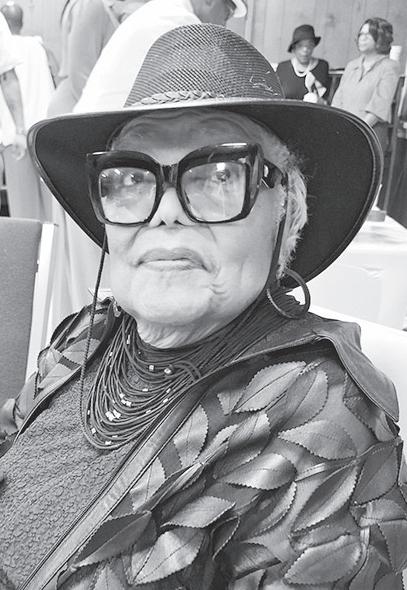
relaxation, according to an article by Harvard Medical School’s Harvard Health Publishing. Clinical trials have shown aerobic activity such as walking, running, swimming or cycling is capable of treating clinical depression and anxiety disorders because it decreases adrenaline and cortisol, while also stimulating endorphin production.
Yoga
Researchers at the University of Utah reported that “the holistic science of yoga is the best method for prevention as well as management of stress and stress-induced disorders,” in a 2012 article published in the International Journal of Preventive Medicine. There are countless free and paid-for online yoga classes for every age and ability, including the popular YouTube channel Yoga With Adriene and Glo, which allows for personalized practice.
Mindful meditation
Mindfulness may come off as a buzzword, but in practice, it means to be present, aware, and to avoid becoming overwhelmed. It is a practice inspired by the Mindfulness-Based Stress Reduction (MBSR) program created by Jon Kabat-Zinn in 1979 at the University of Massachusetts Medical School. Over the course of decades, the program’s research showed how this practice could be used to reduce pain from chronic disease and can lessen the occurrence of stress-related illness. And clearly it works: Institutions from Harvard to the U.S. Army have adopted mindfulness programs to help people cope with stress. Typing “mindful meditation” into a search engine will offer endless guides and resources to getting started.
Aromatherapy
Aromatherapy can be an effective tool to manage stress, according to the Cleveland Clinic, as well as many other scientific studies. Psychology Today recommends lavender, lemon, bergamot, ylang ylang, clary sage and jasmine
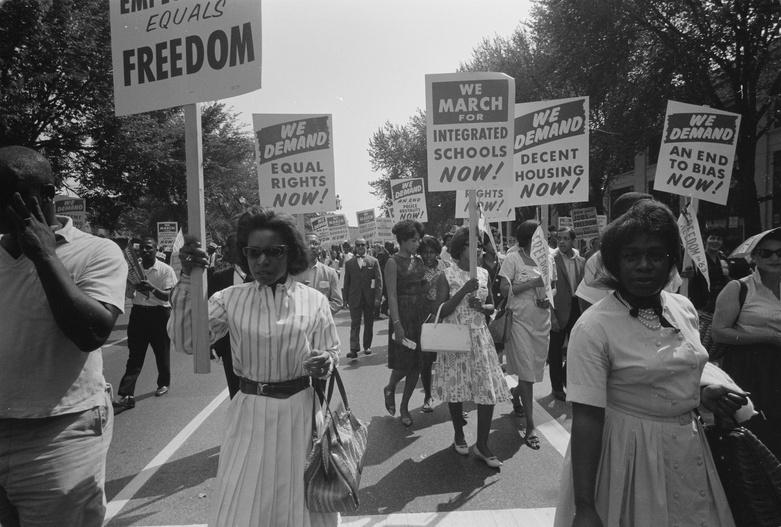
essential oils to alleviate stress. Use a carrier oil like olive, jojoba or avocado oil to topically apply essential oils to your skin (some may be too strong to be directly applied), or add drops of your favorite scents into a diffuser.
Gardening Time in nature has been shown to reduce heart rates, blood pressure, and cortisol levels. While that may be difficult for the many currently in quarantine, gardening may offer a similar benefit. Gardening, or “therapeutic horticulture,” was found to decrease the severity of clinical depression in a 2009 study published by Research and Theory for Nursing Practice. If you don’t have access to outdoor space, indoor plants in pots can bring all the benefits of gardening inside.
Crafts
Experts believe crafting can be an aid for those dealing with chronic pain, anxiety or depression. The phenomenon of getting enthralled in a craft such as crocheting can be described as “flow,” a term coined by psychologist Mihaly Csikszentmihalyi, who suggests flow is the secret to being happy.
See more on afro.com
This article was originally published by Stacker.
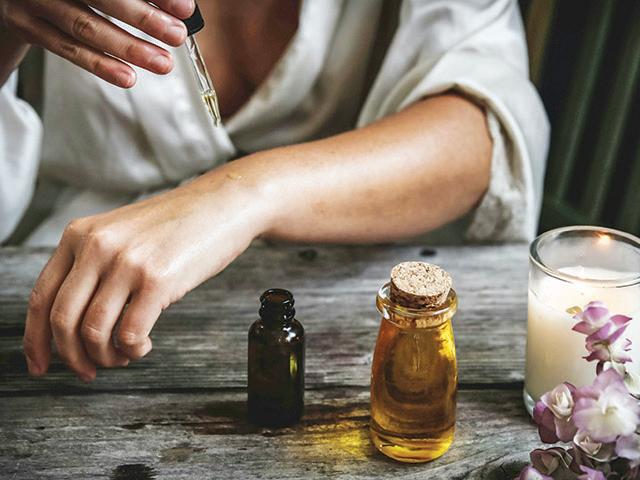

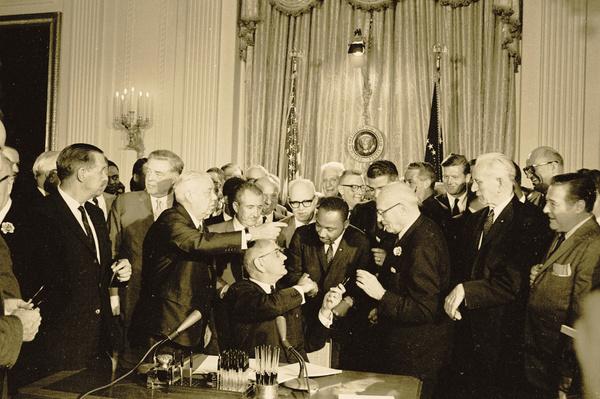

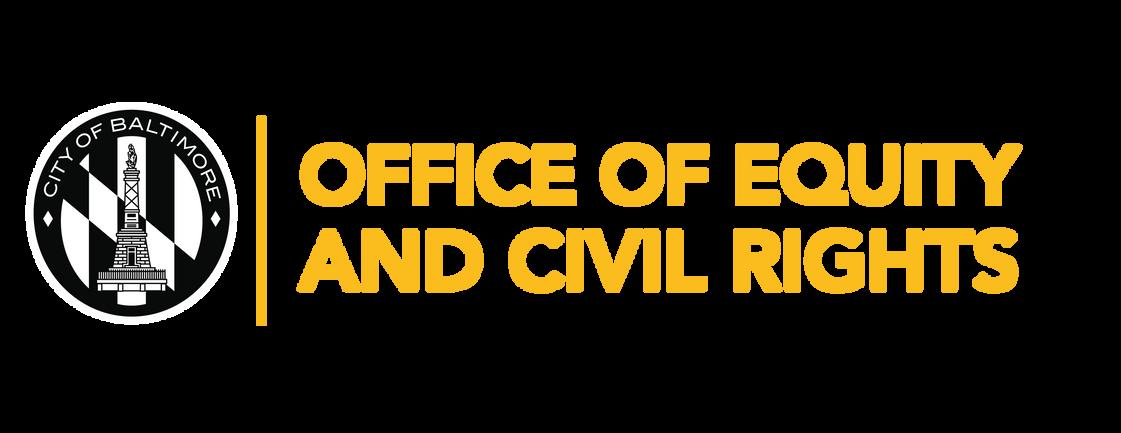

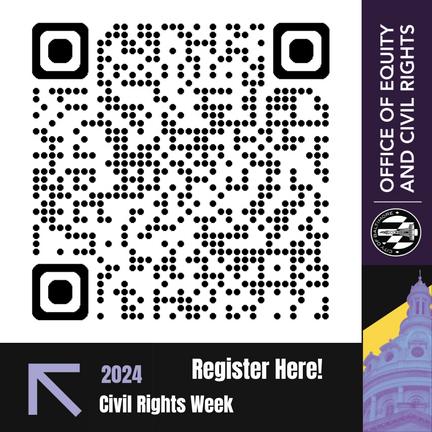


Commutes aren’t created equal: How to shape your commute
By Vanessa Quirk
Hate your commute? You’re not alone. According to a survey of 1,400 commuters that Lyft conducted this month, 21 percent of Americans slightly or strongly dislike their commutes.
Research shows that long commutes, particularly those conducted behind the wheel, can negatively impact physical and mental health. But it doesn’t have to be that way. In fact, a properly designed commute can even be good for you. Here’s what the research shows about what makes the perfect ride to work.
Good commutes enable transitions
Remote work may have its advantages, but one drawback is that it removes the barrier between your office and your home. Switching between them, known as “boundary work,” can cause distress, and, over time, lead to burnout.
But commuting between home and office creates a clear boundary. It also gives the mind time to adjust and transition between roles. “Commutes can give us a more refreshed mindset,” Dr. Clifton Berwise, a psychologist at Modern Health, told Lyft, “so that we can do a better job the next time. It’s like when you exercise, your muscles need time to recharge to refresh, so you can lift harder the next day.”
Berwise notes that it’s not just your workplace that will see the benefits, in terms of your productivity and energy, but also your home life. “If I just logged off, and I’m still in problem-solving mode with my
partner, it shifts the relationship, especially if that becomes a pattern,” says Berwise. “The commute gives you the opportunity to better connect, to be fully in that moment.”
But not all commutes are created equal—their capacity to help people disconnect from work and recharge depends on the quality of the commute itself.
“Commutes can give us a more refreshed mindset, so that we can do a better job the next time.”
Good commutes are relaxing and passive
You may assume that the number one determinant of a good or bad commute is length, but, according to a 2022 study in Organizational Psychology Review, the most important characteristic is actually how relaxing the commute is. If workers could use their commuting time for “personally fulfilling uses … such as listening to music or podcasts, or calling a friend,” they reported being more able to create healthy, psychological boundaries between their work and home lives. However, if they spent their time being stressed, the benefits weren’t experienced.
Similarly, another 2023 study that surveyed 294 Spanish commuters found that those who drive—who have to actively pay attention to the
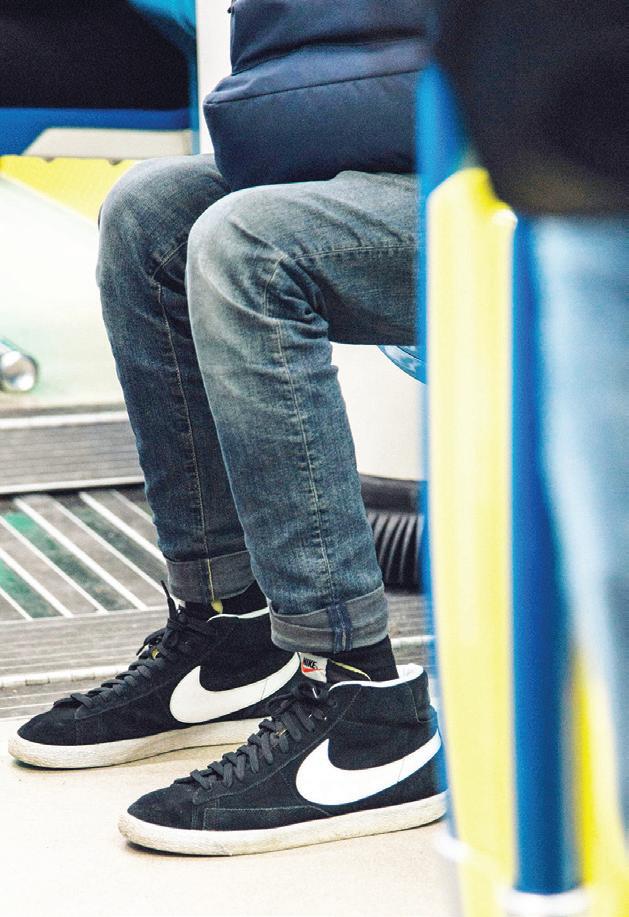
Unsplash / charlesdeluvio
Most working adults have some type of commute if they make a living outside of their home. But getting to work doesn’t always have to be a hassle– sometimes it can be the perfect time to relax and regain focus.
road and navigate challenges like traffic—found that their commute made them feel more “under pressure, less happy, and their sleep quality [was] affected.” Researchers at the University of Sheffield found in 2011 that the negative psychological effects of driving particularly impact women commuters.
Dr. Berwise recommends that people who do not have to drive their own personal vehicle to work, who can take public transportation or rideshare, take the opportunity to practice mindfulness: “If you don’t have to worry about your physical safety, you can just be aware of what’s going on around you, you can
take in the scenery, you could listen to guided meditations.”
For those who find disconnecting or relaxing particularly challenging, Dr. Berwise recommends using the time to make a to-do list or contemplate the day. The latter approach can be particularly helpful:
A 2017 experiment at Microsoft found that workers who took surveys at the beginning of the day, to prepare them for work, and at the end of the day, to reflect and detach from work, resulted in “fewer after-hours emails,” helping them set boundaries between their work and personal lives.
Good commutes offer structure—and even create good habits
Another benefit of a commute is that it can create a ritual—a consistent, repeated activity that creates a sense of stability and certainty, mitigating anxiety. If you drive your own vehicle, try to leave around the same time every day, but also try to listen to a radio program or audiobook that you will look forward to.
Because it’s so structured, commuting can also provide an opportunity to create and maintain a healthy habit. Many of Dr. Berwise’s clients mention that they wish to improve their personal relationships but feel they don’t have time: “I’m like, ‘Well, on your commute, can you use the time to talk to someone?’ And that builds a pattern for them.”
Others decide to even extend their commute by going for a walk or to the gym before entering the office or returning home—another tactic Berwise recommends because the
physical movement facilitates the “reset” people need to transition into or out of work mode.
Five ways to optimize your commute
So how can you optimize your commute to maximize the benefits for your mental health?
Try to avoid commutes where you must be active and aware. Whenever possible, take public transportation or rideshare, so you can be passive and have more control over your commute experience.
Use your commuting time to relax: Listen to an audiobook or guided meditation, call a friend, or just look out the window.
If you’re anxious, use your commute to prepare for or reflect on your day or write a to-do list.
Try out different tactics each week (relaxing, to-do lists, walking, talking, etc.) to see what makes you feel better healthy—and turn that into your routine.
Be intentional: Use your commute as a time and space to disconnect, recharge, and transition to and from “work mode” or “home mode.”
This research was conducted online within the United States by The Harris Poll from August 22 through August 26, 2024. A representative sample of 1,404 respondents aged 18+ completed the survey. All respondents had to regularly commute to work (via personal driving, carpool, public transportation, rideshare, etc.) to qualify.
This article was originally published by Stacker Media.



Unsplash/Cristina Glebova
tation and exercise” to improve and maintain his mental health.
Eli Williamson, co-founder of Leave No Veterans Behind, told the AFRO that he uses swimming to better his health.
“It’s a place that forces you to breathe,” said Williamson. “You can’t swim being tight, rigid.”
Williamson also views swimming as beneficial in teaching “balance and about relaxation.”
Disconnecting from technology
Hayes said making sure he takes time away from his phone, laptop and the internet helps him enjoy the life in front of him.
rest. You have to know when to turn it off so you can actually get that rest time.”
Connecting with others
Though taking a break from technology is encouraged, Williamson said connecting with others is an important aspect of self-care.
“People are very disconnected,” said Williamson. “Right now everyone is connected through phones, but very disconnected interpersonally. They don’t have proximity to one another.”
According to the Army Resilience Directorate, feeling connected with others can help prevent suicide and increase quality of life.
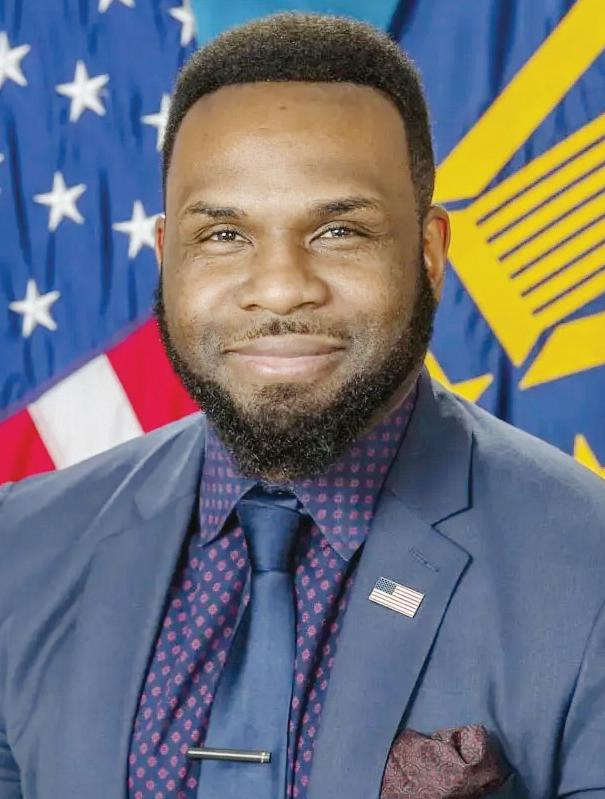
By Tashi McQueen AFRO Staff Writer tmcqueen@afro.com
Self-care and wellness have become top of mind for people all around the world. Self-care can look like therapy or time alone with a book.
The World Health Organization (WHO) defines self-care as “the ability of individuals, families and communities to promote their own health, prevent disease, maintain health and to cope with illness.”
Many can benefit from self-care and veterans are no exception.
“I’ve learned over the years from several different veterans the importance behind taking care of myself,” said Terrence Hayes, deputy assis-
tant secretary of the Office of Public and Intergovernmental Affairs at the U.S. Department of Veteran Affairs.
“They taught me that if I take an interest in self care that I would be the
“I find that when I tend to disconnect from those items, I’m able to reset my mind,” said Hayes. “I’m able to put things in better perspective and my stress level tends to go down.”
Hayes recognized that in a tech-
On the flipside of connecting with others, Hayes said making sure he has alone time to journal is important to him because it can be “humbling and restful.”
“Journaling allows me the opportunity to write my thoughts down.
“I’ve learned over the years from several different veterans the importance behind taking care of myself. They taught me that if I take an interest in self care that I would be the best version of myself professionally, personally.”
best version of myself professionally, personally.”
Hayes shared that mental health is one of the most important ways he practices self-care.
Hayes said he uses “yoga, medi-
nological world this can be challenging, but it’s worth it.
“To be able to disconnect from them at least an hour before you lay down for bed is critical,” said Hayes. “You’re allowing your body to truly
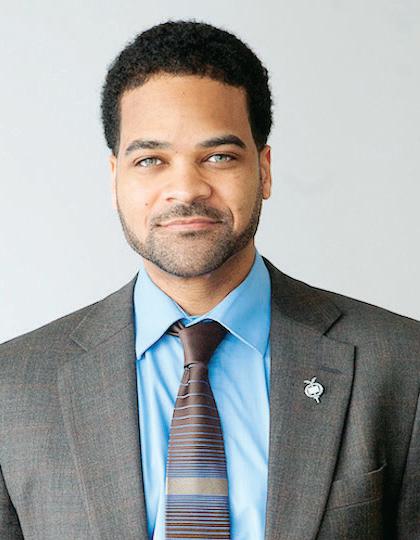
Put down things like goals and aspirations,” said Hayes. “I’m able to go back in my journal and see the things that I’ve written and see some of the things I’ve been able to accomplish.”



SUPERIOR COURT OF THE DISTRICT OF COLUMBIA
PROBATE DIVISION ADMINISTRATION NO. 2024ADM000386
BETTY W. ROBINSON Name of Decedent Notice of Appointment, Notice to Creditors and Notice to Unknown Heirs
MICHAEL FRANCIS ADAMS, whose address is 1810
IRVING ST N.E. WASHINGTON DC 20018 was ap-
pointed Personal Representative of the estate of BET-
TY W. ROBINSON, who died on DECEMBER 10, 2023 with a Will and will serve without Court supervision. All unknown heirs and heirs whose whereabouts are unknown shall enter their appearance In this proceeding. Objections to such, appointment shall be filed With the Register of Wills, D.C., Building A, 515 5th Street, N.W., 3rd Floor, Washington, D.C. 20001, on or before MARCH 13, 2025. Claims against the decedent shall be presented to the undersigned with a copy to the Register of Wills or filed with the Register of Wills with a copy to the undersigned, on or before MARCH 13, 2025 or be forever barred. Persons believed to be heirs or legatees of the decedent who do not receive a copy of this notice by mail within 25 days of its publication shall so inform the Register of Wills, including name, address and relationship. Date of first publication: SEPTEMBER 13, 2024 Name of newspaper and/or periodical: Daily Washington Law Reporter AFRO American Newspapers
MICHAEL FRANCIS ADAMS Personal Representative TRUE TEST COPY REGISTER OF WILLS 9/13, 9/20, 9/27/24
SUPERIOR COURT OF THE DISTRICT OF COLUMBIA PROBATE DIVISION
ADMINISTRATION NO. 2024ADM000946
CHARLES W. HARGRAVE AKA CHARLES WILLIAM HARGRAVE Name of Decedent
WILLIAMS C. KING, POWERS, LEWIS & KING PLLC 5039 CONNECTICUT AVENUE NW BUILDING ONE WASHINGTON DC 20008 Notice of Appointment, Notice to Creditors and Notice to Unknown Heirs
Date of first publication: SEPTEMBER 06, 2024 Name of newspaper and/or periodical: Washington Law Reporter AFRO American Newspapers
ALICIA SMITH Personal Representative TRUE TEST COPY REGISTER OF WILLS 9/06, 9/13, 9/20/24
SUPERIOR COURT OF THE DISTRICT OF COLUMBIA PROBATE DIVISION ADMINISTRATION NO. 2024ADM000976 PAMELA BAYLOR Name of Decedent Notice of Appointment, Notice to Creditors and Notice to Unknown Heirs
ASHLEY SIMMONS, whose address is 500 21ST STREET NE WASHINGTON DC 20002 was appointed Personal Representative of the estate of PAMELA BAYLOR who died on MAY 16, 2024 without a Will and will serve without Court supervision. All unknown heirs and heirs whose whereabouts are unknown shall enter their appearance In this proceeding. Objections to such, appointment shall be filed With the Register of Wills, D.C., Building A, 515 5th Street, N.W., 3rd Floor, Washington, D.C. 20001, on or before MARCH 06, 2025. Claims against the decedent shall be presented to the undersigned with a copy to the Register of Wills or filed with the Register of Wills with a copy to the undersigned, on or before MARCH 06, 2025 or be forever barred. Persons believed to be heirs or legatees of the decedent who do not receive a copy of this notice by mail within 25 days of its publication shall so inform the Register of Wills, including name, address and relationship. Date of first publication: SEPTEMBER 06, 2024 Name of newspaper and/or periodical: Washington Law Reporter AFRO American Newspapers
ASHLEY SIMMONS Personal Representative
OF WILLS 9/06, 9/13, 9/20/24
NICOLE M. CHESTANG, whose address is 251 W. INDIAN CREEK DRIVE, MOBILE AL 36607 was appointed Personal Representative of the estate of CHARLES W. HARGRAVE AKA CHARLES WILLIAMS HARGRAVE, who died on JULY 05, 2024 with a Will and will serve without Court supervision. All unknown heirs and heirs whose whereabouts are unknown shall enter their appearance In this proceeding. Objections to such, appointment shall be filed With the Register of Wills, D.C., Building A, 515 5th Street, N.W., 3rd Floor, Washington, D.C. 20001, on or before MARCH 13, 2025. Claims against the decedent shall be presented to the undersigned with a copy to the Register of Wills or filed with the Register of Wills with a copy to the undersigned, on or before MARCH 13, 2025 or be forever barred. Persons believed to be heirs or legatees of the decedent who do not receive a copy of this notice by mail within 25 days of its publication shall so inform the Register of Wills, including name, address and relationship. Date of first publication: SEPTEMBER 13, 2024 Name of newspaper and/or periodical: Daily Washington Law Reporter AFRO American Newspapers
NICOLE M. CHESTANG Personal Representative
TRUE TEST COPY REGISTER OF WILLS 9/13, 9/20, 9/27/24
SUPERIOR COURT OF THE DISTRICT OF COLUMBIA PROBATE DIVISION ADMINISTRATION NO. 2024ADM000790
ELNORA EASTER LEWIS AKA
ELNORA E. LEWIS Name of Decedent D. GREER 1350 LEEGATE ROAD NW WASHINGTON DC 20012 Notice of Appointment, Notice to Creditors and Notice to Unknown Heirs MURIEL L. LEWIS, whose address is 703 ADRIAN STREET, SE WASHINGTON DC 20019 was appointed Personal Representative of the estate of ELNORA EASTER LEWIS AKA ELNORA E. LEWIS, who died on APRIL 21, 2024 with a Will and will serve without Court supervision. All unknown heirs and heirs whose whereabouts are unknown shall enter their appearance In this proceeding. Objections to such, appointment shall be filed With the Register of Wills, D.C., Building A, 515 5th Street, N.W., 3rd Floor, Washington, D.C. 20001, on or before MARCH 13, 2025. Claims against the decedent shall be presented to the undersigned with a copy to the Register of Wills or filed with the Register of Wills with a copy to the undersigned, on or before MARCH 13, 2025 or be forever barred. Persons believed to be heirs or legatees of the decedent who do not receive a copy of this notice by mail within 25 days of its publication shall so inform the Register of Wills, including name, address and relationship. Date of first publication: SEPTEMBER 13, 2024 Name of newspaper and/or periodical: Daily Washington Law Reporter AFRO American Newspapers
MURIEL L. LEWIS Personal Representative TRUE TEST COPY
OF WILLS 9/13, 9/20, 9/27/24
SUPERIOR COURT OF THE DISTRICT OF COLUMBIA
PROBATE DIVISION
ADMINISTRATION NO. 2024ADM999
JANE DAVIS ADAMS Name of Decedent
TYECHIA L. WHITE ESQ 300 NEW JERSEY AVE NW SUITE 300 WASHINGTON DC 20001 Notice of Appointment, Notice to Creditors and Notice to Unknown Heirs
BRANDON EUGENE ADAMS, whose address is 1305 CHALMERS RD was appointed Personal Representative of the estate of JANE DAVIS ADAMS, who died on FEBRUARY 11, 2024 without a Will and will serve without Court supervision. All unknown heirs and heirs whose whereabouts are unknown shall enter their appearance In this proceeding. Objections to such, appointment shall be filed With the Register of Wills, D.C., Building A, 515 5th Street, N.W., 3rd Floor, Washington, D.C. 20001, on or before MARCH 13, 2025. Claims against the decedent shall be presented to the undersigned with a copy to the Register of Wills or filed with the Register of Wills with a copy to the undersigned, on or before MARCH 13, 2025 or be forever barred. Persons believed to be heirs or legatees of the decedent who do not receive a copy of this notice by mail within 25 days of its publication shall so inform the Register of Wills, including name, address and relationship. Date of first publication: SEPTEMBER 13, 2024
Name of newspaper and/or periodical: Daily Washington Law Reporter AFRO American Newspapers
BRANDON EUGENE ADAMS Personal Representative TRUE TEST COPY REGISTER OF WILLS 9/13, 9/20, 9/27/24
SUPERIOR COURT OF THE DISTRICT OF COLUMBIA PROBATE DIVISION ADMINISTRATION NO. 2024ADM001028 DIANE GRAHAM Name of Decedent Notice of Appointment, Notice to Creditors and Notice to Unknown Heirs CHRISTINA LASHAWN GRAHAM, whose address is 624 RIDGE RD SE WASHINGTON DC 20019 was appointed Personal Representative of the estate of DIANE GRAHAM, who died on SEPTEMBER 27, 2019 without a Will and will serve without Court supervision. All unknown heirs and heirs whose whereabouts are unknown shall enter their appearance In this proceeding. Objections to such, appointment shall be filed With the Register of Wills, D.C., Building A, 515 5th Street, N.W., 3rd Floor, Washington, D.C. 20001, on or before MARCH 20, 2025. Claims against the decedent shall be presented to the undersigned with a copy to the Register of Wills or filed with the Register of Wills with a copy to the undersigned, on or before MARCH 20, 2025 or be forever barred. Persons believed to be heirs or legatees of the decedent who do not receive a copy of this notice by mail within 25 days of its publication shall so inform the Register of Wills, including name, address and relationship. Date of first publication: SEPTEMBER 20, 2024 Name of newspaper and/or periodical: Daily Washington Law Reporter AFRO American Newspapers
CHRISTINA LASHAWN GRAHAM Personal Representative TRUE TEST COPY REGISTER OF WILLS 9/20, 9/27,10/04/24
SUPERIOR COURT OF THE DISTRICT OF COLUMBIA PROBATE DIVISION 2024FEP000105 MAY 14, 2024 Date of Death
DONALD FLOYD JONES Name of Decedent
NOTICE OF APPOINTMENT OF FOREIGN PERSONAL REPRESENTATIVE AND NOTICE TO CREDITORS
LINDA K. JONES whose address is 309 SERENA STREET, UPPER MARLBORO, MARYLAND
20774 was appointecd representative of the estate of DONALD FLOYD JONES deceased, by the REGISTER OF WILLS IN THE ORPHANS’ Court for PRINCE GEORGE’S County, State of MARYLAND, on SEPTEMBER 03, 2024. Service of process may be made upon PATRICIA BRADFORD 4800 FRANKLIN STREET, WASHINGTON DC 20018 whose designation as District of Columbia agent has been filed with the Register of Wills, D.C. The decedent owned the following District of Columbia real property: 3044 MONROE STREET N.E. WASHINGTON D.C. Claims against the decedent may be presented to the undersigned and filed with the Register of Wills for the District of Columbia, Building A, 515 5th Street, N.W., 3rd Floor, Washington, D.C. 20001 within 6 months from the date of first publication of this notice. Date of first publication: SEPTEMBER 20, 2024 Name of newspaper, and/or periodical: The Daily Washington Law Reporter AFRO-American
LINDA
SUPERIOR COURT OF THE DISTRICT OF COLUMBIA PROBATE DIVISION ADMINISTRATION NO. 2024ADM001026
EUGENE R. BANKS Name of Decedent KHALFANI DRUMMER ESQ. 14310 BENTLEY PARK DR BURTONSVILLE MD 20866 Notice of Appointment, Notice to Creditors and Notice to Unknown Heirs TWYLA G. BANKS, whose
9/20,
COURT OF THE
COLUMBIA PROBATE DIVISION 2024FEP000102 OCTOBER 8, 2019 Date of Death EMERSON LEE SUTTON Name of Decedent NOTICE OF APPOINTMENT OF FOREIGN PERSONAL REPRESENTATIVE AND NOTICE TO CREDITORS PAMELA SUTTON whose address is 3116 63RD AVENUE CHEVERLY, MD 20785 was appointecd representative of the estate of EMERSON LEE SUTTON deceased, by the ORPHANS’ Court for PRINCE GEORGE’S County, State of MARYLAND, on JANUARY 19, 2022. Service of process may be made upon ROLAND B. DENNEY 4111 KANSAS AVENUE NW APT. 204 WASHINGTON, DC 20011 whose designation as District of Columbia agent has been filed with the Register of Wills, D.C. The decedent owned the following District of Columbia real property: ONE-SIXTH (1/6) INTEREST IN THE REAL ESTATE PROPERTY LOCATED AT 126 TUCKERMAN STREET NE, WASHINGTON DC 20011. Claims against the decedent may be presented to the undersigned and filed with the Register of Wills for the District of Columbia, Building A, 515 5th Street, N.W., 3rd Floor, Washington, D.C. 20001 within 6 months from the date of first publication of this notice.
Date of first publication: SEPTEMBER 20, 2024 Name of newspaper, and/or periodical: The Daily Washington Law Reporter AFRO-American PAMELA SUTTON Personal Reperesenative
TRUE TEST COPY REGISTER OF WILLS 9/20, 9/27, 10/04/24
SUPERIOR COURT OF THE DISTRICT OF COLUMBIA PROBATE DIVISION ADMINISTRATION NO. 2024ADM001042 TYWANA SMITH Name of Decedent
NATALIE S. WALKER ESQ. 1101 CONNECTICUT AVENUE NW SUITE 402 WASHINGTON DC 20036 Notice of Appointment, Notice to Creditors and Notice to Unknown Heirs JAKIA SMITH , whose address is 3541 JAY STREET, NE, #101 WASHINGTON DC 20019 was appointed Personal Representative of the estate of TYWANA SMITH, who died on FEBRUARY 22, 2024 without a Will and will serve without Court supervision. All unknown heirs and heirs whose whereabouts are unknown shall enter their appearance In this proceeding. Objections to such, appointment shall be filed With the Register of Wills, D.C., Building A, 515 5th Street, N.W., 3rd Floor, Washington, D.C. 20001, on or before MARCH 20, 2025. Claims against the decedent shall be presented to the undersigned with a copy to the Register of Wills or filed with the Register of Wills with a copy to the undersigned, on or before MARCH 20, 2025 or be forever barred. Persons believed to be heirs or legatees of the decedent who do not receive a copy of this notice by mail within 25 days of its publication shall so inform the Register of Wills, including name, address and relationship.
Date of first publication: SEPTEMBER 20, 2024 Name of newspaper and/or periodical: Daily Washington Law Reporter AFRO American Newspapers
JAKIA SMITH Personal Representative TRUE TEST COPY REGISTER OF WILLS 9/20, 9/27,10/04/24
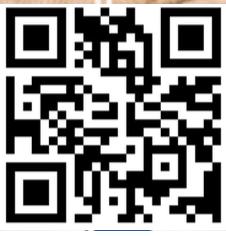

For
proposing to repeal and re-ordain, with amendments Article I - General Provisions Section 9 Baltimore City Charter (1996 Edition) SECTION 1. BE IT RESOLvED BY THE MAYOR AND CITY COuNCIL Of BALTIMORE, That the Charter of Baltimore City is proposed to be amended


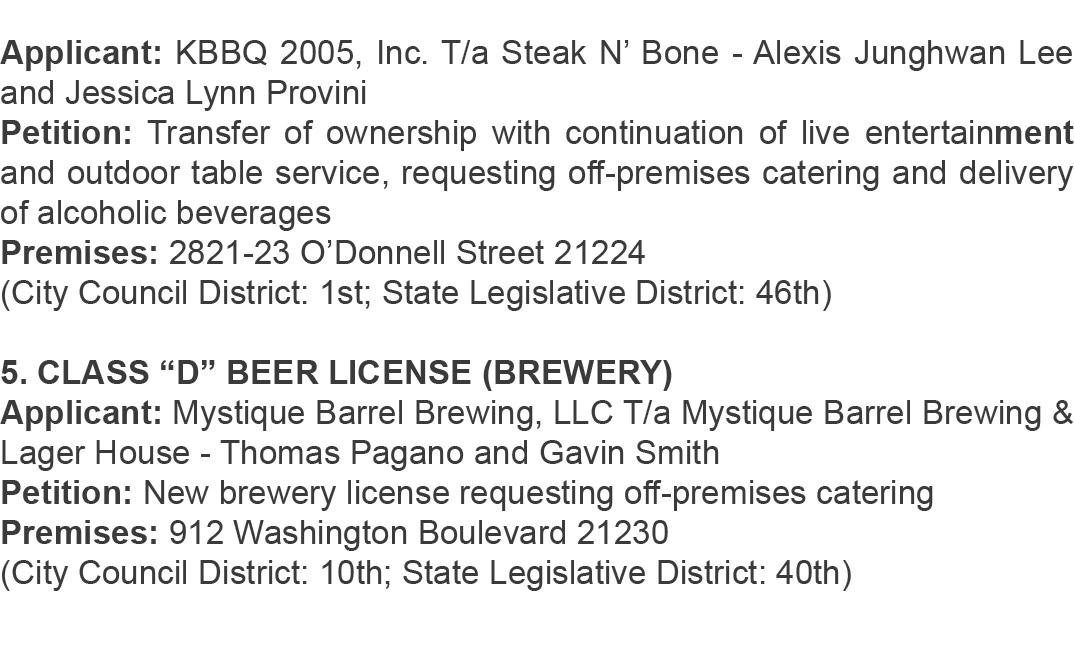

of 50.00. Conditions and requirements of the Bid are found in the bid
contractors bidding on this Contract must first be prequalified by
of
Contractors Qualification Committee. Interested parties should call (410)
or contact OBC at 4 S Frederick St., 4 th Floor, Baltimore, MD 21202. If a bid is submitted by a joint venture (“JV”), then in that event, the document that established the JV shall be submitted with the bid for verification purposes. The Prequalification Category required for bidding on this project is E13003 Water and/ or Sewer Treatment Plants and Pumping Stations. Cost Qualification Range for this work shall be $60,000,000.00 to $70,000,000.00
A “Pre-Bidding Information” session will be conducted virtually via Microsoft Teams on October 3, 2024 at 10:00 a.m. Meeting ID 290 427 541 819, Passcode: enw6h2
Vendor can attend by phone (audio only) 1 667-228-6519, conference ID: 229 477 238#. A site visit will be held on October 9, 2024 at 10:00 a.m.
All questions from bidders must be summited in writing to the project manager, Abdul Jafari Abdul.jafari@baltimorecity.gov by October 28, 2024 at 5:00 P.M.
To purchase a bid book, please make an electronic request at: https://publicworks.baltimorecity.gov/dpw-construction-projects-notice-letting and dpwbidopportunities@baltimorecity.gov. For further inquiries about purchasing bid documents, please contact the assigned Contract Administrator: lwalston@ baltimorecity.gov.
Principal items of work for this contract include, but are not limited to:
l. Demolition of Gravity Sludge Thickeners (GSTs) No. 1, 2, and 4 mechanisms, drives, underflow pumps, grinders, sump pumps, influent lift pumps, seal water systems, flushing water systems, scum pumps, and associated existing piping and appurtenances: demolition of existing Secondary Clarifiers No. 1 through 4, 5A/B, and 6AB mechanisms and drives, scum pumps, level instruments, piping, and associated appurtenances; demolition of existing sluice and slide gates; demolition of existing Secondary Clarifier and GST power distribution and control systems; demolition of miscellaneous power supply and control systems; demolition of miscellaneous HVAC and plumbing systems; demolition of miscellaneous architectural items; demolition of existing odor control system .
2. Provision and installation of new GST mechanisms and drives, associated piping and appurtenances; provision and installation of new Secondary Clarifier mechanisms and drives; systems and associated piping and appurtenances; provision and installation of new underflow pumps, grinders, sump pumps, influent lift pumps, seal water systems, flushing water systems, scum pumps, and associated existing piping and appurtenances; provision and installation of new sluice and slide gates; provision and installation of new power distribution and control systems; provision and installation of new miscellaneous HVAC and plumbing systems; provision and installation miscellaneous of new architectural items, provisions and installation of concrete restoration and new coating systems; provision and installation of new scum piping and associated site restoration.
The MBE goal is 22%
The Housing Authority of Baltimore City (“HABC”) will issue a Request for Qualifications (“RFQ”) for interested and qualified firms to provide professional services from design through construction on an as needed basis to include, but not be limited to, architectural, engineering, and landscape architecture services. All services must be performed in accordance with the regulations and requirements of the U.S. Department of Housing and Urban Development (HUD) and all applicable state and local laws. BIDS WILL BE DUE no later than 2:00 p.m. Eastern Time on Friday, October 25, 2024
A non-mandatory pre-bid conference will be held on Wednesday, October 9, 2024, at 11:00 a.m., which will be scheduled as a virtual meeting. The entire RFQ can be viewed and downloaded by visiting https://habc. bonfirehub.com/projects on or after Monday, October 30, 2024
Questions regarding the RFQ should be directed in writing to the address and individual indicated below and must include the reference: HABC RFQ Number B-2020-24.
Housing Authority of Baltimore City Division of Fiscal Operations, Procurement Department 417 E. Fayette Street, Room 414 Baltimore, Maryland 21202 Attention: John Airey, Senior Vice President of Procurement Tel: 410-396-3261 john.airey@habc.org

SUPERIOR COURT OF THE DISTRICT OF COLUMBIA
PROBATE DIVISION ADMINISTRATION NO. 2024ADM1047 VIOLENA BEAN Name of Decedent
WILLIAM A. BLAND ESQUIRE 80 M STREET SE #330 WASHINGTON DC 20003
Notice of Appointment, Notice to Creditors and Notice to Unknown Heirs
RAYMOND WAYTES , whose address is 3323 AMES
STREET NE, WASHINGTON DC 20019 was appointed Personal Representative of the estate of VIOLENA BEAN, who died on DECEMBER 8, 2023 without a Will and will serve without Court supervision. All unknown heirs and heirs whose whereabouts are unknown shall enter their appearance In this proceeding. Objections to such, appointment shall be filed With the Register of Wills, D.C., Building A, 515 5th Street, N.W., 3rd Floor, Washington, D.C. 20001, on or before MARCH 20, 2025. Claims against the decedent shall be presented to the undersigned with a copy to the Register of Wills or filed with the Register of Wills with a copy to the undersigned, on or before MARCH 20, 2025 or be forever barred. Persons believed to be heirs or legatees of the decedent who do not receive a copy of this notice by mail within 25 days of its publication shall so inform the Register of Wills, including name, address and relationship. Date of first publication: SEPTEMBER 20, 2024 Name of newspaper and/or periodical: Daily Washington Law Reporter AFRO American Newspapers
RAYMOND WAYTES Personal Representative TRUE TEST COPY REGISTER OF WILLS 9/20, 9/27,10/04/24


